
Can you get a PhD without a master’s degree?

Traditionally seen as the pinnacle of academic success, a Doctor of Philosophy (PhD) rigorously prepares you for a career in research and academia that might even earn you the title of “Professor” one day. Getting a PhD is no easy feat, and involves years of gruelling hard work, often with a few life crises and probably thoughts of quitting in between. That said, the question of whether there’s a ‘shortcut’ on how to get a PhD often pops up in student forums and discussions.
Although getting a master’s degree after completing your undergraduate studies is the conventional route taken towards a PhD, you can in fact bypass your master’s degree entirely and go straight into a doctorate programme. Granted, not all subjects or countries have this option, but there’s plenty to go around if you want to save time and money to get your research going.
The University of California, Berkeley , for instance, only admits Bachelor’s degree holders into its political science PhD programme, with a possibility for students to obtain a master’s qualification if they withdraw from the doctoral degree as long as sufficient coursework has been completed. Similarly, you can get a PhD in the Ohio State University’s chemical engineering programme without having done a master’s .
Across the pond, the University of Cambridge can accept students without a master’s degree , where they’ll be placed in a probationary year before progressing into their dissertation. As you can see, various routes are available for direct PhD entry in different fields.
https://twitter.com/elMunir5/status/1495823917986025478
How long does it take to get a PhD?
The doctoral degree is primarily a research degree , where you have to come up with your own original ideas and spend some years of fieldwork, lab work, or any other type of real-world practice that will contribute towards your final dissertation.
If you’re wondering why the US is a bit relaxed in terms of entry requirements, it’s probably because a PhD there is almost never a pure research degree, and generally takes a much longer time to complete as a full-time student than in the UK or Australia.
https://twitter.com/Jamaticulus/status/1495655832045957123
Many US doctorate programmes begin with coursework and assessments in the first two years. After passing an exam, it’s only then that you’ll start working on your research and dissertation. Overall, you’re looking at a time frame of four to six years full-time if you want to get a PhD in an American university.
Compared to anywhere else, you can get a PhD in the US without forking out any for tuition, even for international students. This is because the programmes there tend to be fully-funded , with enough stipend and income from teaching assistantships to cover your cost of living.
Meanwhile, a PhD in Australia or the UK is generally a pure research degree, where you dive headlong into your dissertation topic from the start of your programme. You’ll already be discussing your doctoral thesis with a supervisor in your first year, starting with a literature review and critiquing existing scholarship on your subject before moving on to independent research in the following years. The programme duration is shorter than in the US — a full-time study takes about three to four years.
How can I get a PhD without a master’s degree as an international student?
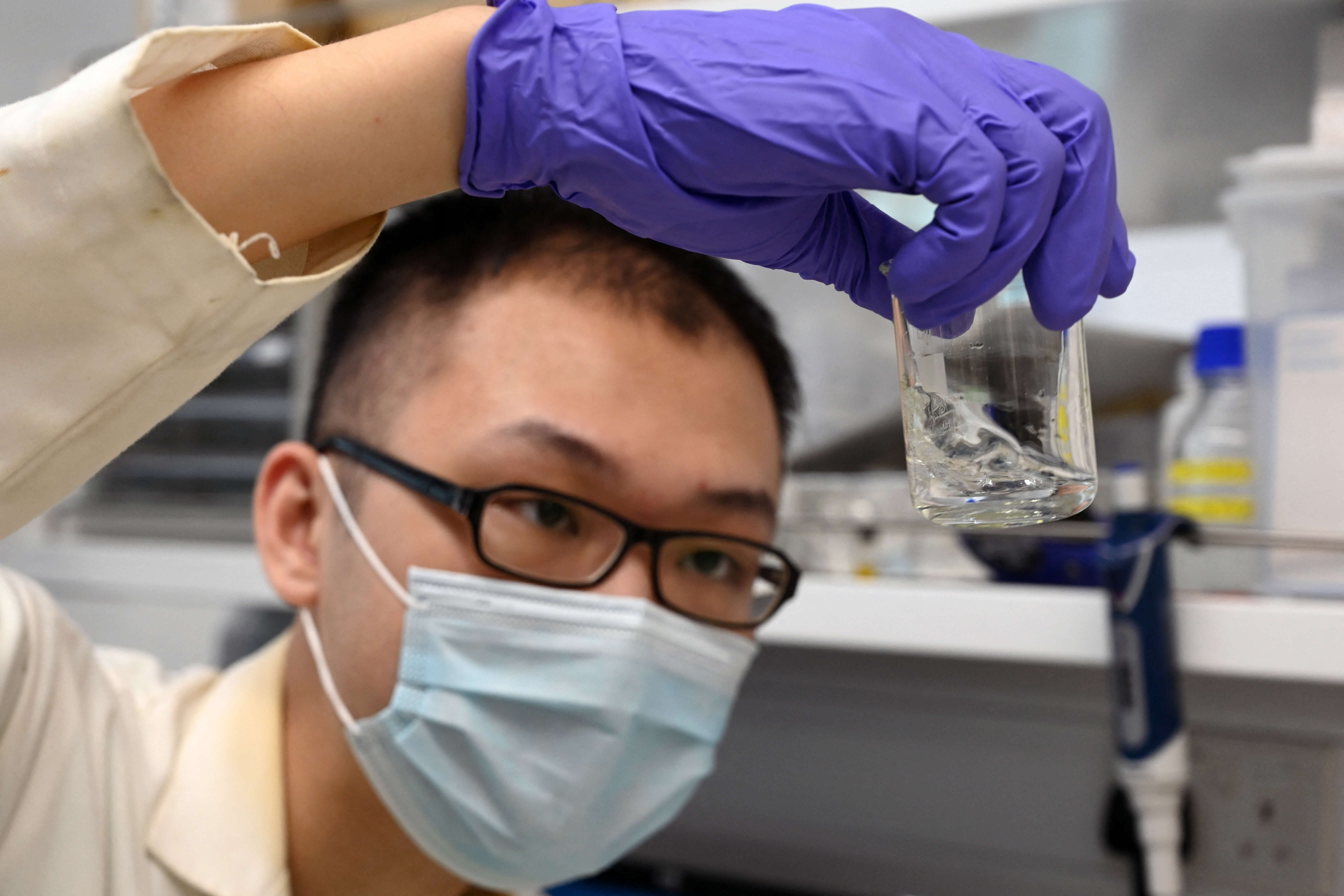
Full-time PhD programmes in the US are a few years longer compared to other countries. Source: Roslan Rahman/AFP
It goes without saying that being in good academic standing will go a long way in getting into a PhD programme right after your undergraduate studies, but that’s only part of the equation. PhD applications require more paperwork, including a statement of purpose tailored to the university and recommendation letters from your previous instructors that can vouch for your potential as a candidate.
The best way to get into your programme though? Contact the university directly to express your interest and see what funding package is available based on your circumstances. The graduate admissions page will list what is required for application, where you’ll know if you can be admitted with just a bachelor’s degree.
Although skipping a step to get a PhD sounds ideal, you need to assess if you have the capacity to undertake a high-intensity academic life. A master’s degree might cost you an extra year or two, and a few thousand off your account, but it builds a solid foundation for the kind of discipline and knowledge you will need to survive your PhD.
If you do decide to take the plunge, you might want to look out for programmes that can grant you a master’s qualification along the way, so your hard work pays off in case you choose to withdraw from your PhD in the future.
Popular stories
More doing, less typing: 8 degrees that have little to no essay writing.

Experience vs degree: 7 must-know facts for high school graduates

US$14,895 for a veterinary science degree: The cheapest countries for you to pursue animal healthcare

The immense value of an English Language and Literature degree, according to an entrepreneur

Is it a good time to be getting a PhD? We asked those who’ve done it

10 PhD scholarships in the UK for international students 2022

10 great PhD scholarships in the US for international students 2022
2024 Best Universities That Offer PhD Without Masters
It may sound like a dream, but universities that offer PhD without a masters do exist.

Imagine fast-tracking your way to becoming a doctor in your field, skipping the traditional master’s step, and diving straight into deep, meaningful research. This article is your guide to understanding this unconventional yet rewarding path.
Editorial Listing ShortCode:
We’ll explore the ins and outs of taking this leap to help you decide if this bold academic journey aligns with your aspirations and goals.
Universities That Offer PhD without a Masters Degree

Can you get a doctorate without a masters? For some, the answer is yes. In PhD programs without masters requirements, you can start working on your PhD right after earning your bachelor’s degree. This means you can focus on intensive research and specialized studies sooner.
It’s a path that may suit you if you’re keen on deepening your knowledge and expertise without the intermediate step of a master’s program. Typical eligibility criteria for these programs include:
- Strong undergraduate academic record
- Research experience
- Recommendation letters
- Well-crafted statement of purpose
- Standardized test scores (if required)
According to the Bureau of Labor Statistics (BLS) , higher education often leads to better job prospects and higher earnings. This route not only saves time but can potentially set you up for promising career opportunities.
You’ll be expected to start your research early. This could be a great fit if you’re already clear about your academic interests and ready to commit to a rigorous research schedule.
Advantages of Fast-Tracking to PhD
Deciding to go straight for a PhD without a master’s degree can be a big step toward your future goals. Here are some potential benefits for considering PhD online programs without masters requirements:
- Speed up your journey : By skipping a master’s program, you may get to your career goals faster.
- Save money : Like any college program, earning a master’s degree can be expensive.
- Immediately deep dive into your interests : Passionate about your field? You may jump straight into advanced studies and research.
- Unique opportunities : These programs can help open doors to rare and exciting research chances, placing you at the forefront of innovation early in your career.
- Stand out : Earning a PhD is a powerful statement about your ambition and skills.
Stepping directly into a PhD program may allow you to fast-track your ambitions and pave the way to a fulfilling future.
Disadvantages and Challenges of Direct PhD Programs

Jumping into a PhD without a master’s degree takes courage. It’s crucial to know the hurdles that might pop up before you start researching PhD programs online without masters requirements.
These are some challenges you may encounter:
- Rapid pace : You’ll likely face a steep learning curve without the preparation a master’s program can provide.
- Immediate research pressure : You’re expected to start producing original research right away.
- Fewer networking opportunities : Skipping a master’s program means missing out on making those crucial academic connections that may be valuable down the line.
- Tougher funding : Funding opportunities often lean toward those with master’s degrees, so securing financial support might be more challenging.
- Self-doubt : Without the stepping stone of a master’s, you might question if you’re ready for this big leap.
According to the NSCRC , with more people pursuing advanced degrees, the academic world is getting more competitive. Navigating these challenges requires resilience and a clear vision of your goals. Choosing a direct PhD route is about weighing these hurdles against your determination and passion for your field.
How to Choose a Doctorate without a Masters Degree

Choosing the right PhD program is key. Here are some important factors to consider:
- Accreditation : Accreditation is like a quality stamp for the program, ensuring that it meets certain academic standards. You can find more information at the S. Department of Education – Accreditation .
- Financial aid and scholarships : Cost can be a big factor, and having financial aid or scholarships can make a huge difference. You can visit the FAFSA website for more information.
- Faculty expertise : You want to learn from the best and ensure they have experience in your area of interest.
- Research opportunities : This is your chance to get hands-on experience in your field.
- Program structure and flexibility : It’s important to consider class schedules, online vs. in-person options, and the balance between coursework and research.
Choosing the right doctorate program is a personal decision that will shape your academic journey. Taking the time to weigh these factors carefully can help you find the best choice to fit your goals and needs.
Applying to Universities That Offer PhD without a Master’s Degree

Applying for a PhD program is like presenting your academic story. Here are some tips to help make each part of your application a testament to your passion and potential:
- Your research proposal : This is a window into your interests. Show your enthusiasm and readiness for the field by making it clear, engaging, and indicative of your ability to bring fresh ideas.
- Letters of recommendation : These are your personal champions, so choose mentors or professors who know your strengths intimately and can confidently vouch for your PhD readiness.
- Showcase your research journey : Research experience is a crucial part of your narrative. Highlight your involvement in projects, papers, or presentations.
- Ace the interview : Be prepared to discuss your motivations, research interests, and how you envision your growth in the program.
Your application is a holistic reflection of your academic identity. It should showcase your achievements and excitement for research and knowledge.
Do You Need a Masters to Get a PhD?

While many paths to a PhD traditionally start with a master’s, there’s a growing trend of programs allowing students to jump straight into doctoral studies from their bachelor’s programs.
This option may be perfect for those who are clear about their research interests and ready to dive into academic exploration. If you’re passionate, determined, and have a clear vision for your research, a direct route to a PhD may be your path forward.
Universities Offering Online PhD Without Masters Degree Programs
Methodology: The following school list is in alphabetical order. To be included, a college or university must be regionally accredited and offer degree programs online or in a hybrid format.

Capitol Technology University offers a PhD in Technology with two pathways for students who may not hold a master’s degree. Applicants may either already hold a doctoral degree or earn an MS in Research Methods while earning their PhD. CapTech’s program is fully online, and residencies are not required.
Capitol Technology University is accredited by the Middle States Commission on Higher Education.

Clemson University offers a PhD in Healthcare Genetics and Genomics. Applicants must hold at least a bachelor’s degree in a related field with a 3.0 cumulative GPA. Applicants who hold a master’s in the field may be given preference. The program is fully online, and courses are in a synchronous format.
Clemson University is accredited by the Southern Association of Colleges and Schools Commission on Colleges.

Indiana University offers a PhD in Music Therapy through the Purdue School of Engineering and Technology at IUPUI. Students who do not already hold a master’s degree can earn a Master’s in Music Therapy through the program. The program requires the completion of 90 credit hours, including a dissertation, and is fully online.
Indiana University is accredited by the Higher Learning Commission.

Students who do not hold a master’s degree may apply for a PhD in Computer Science through Mississippi State University. The program is fully online and does not require campus visits. Courses follow a semester schedule, and there are start dates in the fall and spring. Applicants are not required to submit GRE or GMAT scores.
Mississippi State University is accredited by the Southern Association of Colleges and Schools Commission on Colleges.

Students who do not hold a master’s may earn a PhD in Computer Science through Nova Southeastern University’s bachelor’s track. The program requires the completion of 66 credits and is available fully online or on campus. The program has start dates in August, January, and May and follows a semester schedule. NSU is an NSA-designated school.
Nova Southeastern University is accredited by the Southern Association of Colleges and Schools Commission on Colleges.

Saybrook University offers a PhD in Clinical Psychology program that is fully online. Students who do not hold a master’s degree must complete 103 to 109 credits to graduate, while those who do have a master’s in a related field must complete 100 to 106 credits.
The program can typically be completed in 5 years. It offers several specializations that may be declared, including Applied Psychophysiology, Creativity Studies, and Jungian Studies.
Saybrook University is accredited by the Senior Commission of Western Association of Schools and Colleges.

The University of Arizona offers a PhD in Nursing to students who hold a BSN through its BSN-to-PhD program. The program is mostly online, but short residencies are required. The program can potentially be finished in 4 years when attended full-time. Courses follow a semester schedule, and the completion of 79 credits is required to graduate.
The University of Arizona is accredited by the WASC Senior College and University Commission.

The University of Central Florida offers a BSN-to-PhD in Nursing program for those who do not hold a master’s degree in nursing. All coursework is online, but short intensives on campus are required throughout the program. Applicants are not required to submit GRE scores.
The University of Central Florida is accredited by the Southern Association of Colleges and Schools.

The University of Oklahoma offers a PhD in Nursing with a fast-track to PhD option for students who have a BSN but not a master’s degree. All coursework is fully online. The program can potentially be finished in 36 months, and there are start dates in the fall, spring, and summer. The completion of 78 credits is required to graduate.
The University of Oklahoma is accredited by the Higher Learning Commission.

The University of Wisconsin–Milwaukee offers a fully online program for a PhD in Nursing. Students with only a BSN may apply but must complete 15 additional credits before entering the program. The program starts every other year during the summer semester. It can potentially be completed in 3 years.
UWM is accredited by the Higher Learning Commission.
Advance Your Career: Starting Your PhD without a Masters Degree

Starting your PhD journey without a master’s degree can be a bold step forward in advancing your career, particularly if you pursue some of the highest paying doctorate degrees . It’s a path that speaks to those ready to dive into deep academic waters, driven by passion and a clear vision for their future, with the added potential of high financial rewards in cutting-edge and high-demand areas.
If this resonates with you, you can start exploring accredited universities that offer this opportunity, including those providing online PhD programs for working professionals . These flexible programs are designed to accommodate your busy schedule, allowing you to balance your professional responsibilities with your academic pursuits. Your aspirations and determination may fast-track you on your way to becoming an expert in your field!

You're viewing this site as a domestic an international student
You're a domestic student if you are:
- a citizen of Australia or New Zealand,
- an Australian permanent resident, or
- a holder of an Australian permanent humanitarian visa.
You're an international student if you are:
- intending to study on a student visa,
- not a citizen of Australia or New Zealand,
- not an Australian permanent resident, or
- a temporary resident (visa status) of Australia.

Can you do a PhD without a master’s degree?
Study tips Published 5 Apr, 2022 · 6-minute read
If you want the most straightforward answer to the question ‘can you get a PhD without a master’s degree’, it’s yes. Should you apply to study a PhD without a master’s though? Let’s unpack that.
There are quite a few entry requirements you need to meet to apply for a Doctor of Philosophy (PhD). At the core of it, all these requirements are about proving you’re ready to embark on the long (3-4 years full time) and challenging – but incredibly rewarding – process of conducting research and writing a thesis. PhD prerequisites are there to assess your preparedness for this type of study.
So, let’s have a look at what the PhD prerequisites are in Australia and the questions we’re commonly asked about them.
Can I do a PhD without a degree?
In Australia, you’ll need to have completed a degree (undergraduate or postgraduate) relevant to your proposed research topic and approved by the university to be considered as a candidate. However, the good news is, for those of you wondering ‘can you get a PhD without a bachelor’s?’ the answer is yes – it is possible at some universities.
Say you finished high school and went straight into the workforce. You built experience in your field over years of hard work. After a while, you decide that you’d like a qualification to solidify your knowledge and skills, or to upskill in your area and open even more doors. So, you apply for postgraduate studies.
Many universities in Australia will consider applicants for postgrad study (typically graduate certificates) based on proof of extensive professional experience and other post-secondary studies (certificates from TAFE, for example) in a relevant field, rather than the traditional completion of bachelor’s level studies.
Admission into a graduate certificate without a bachelor’s degree is very much dependent on your study area of choice and the institution at which you wish to study. Always check the specific prerequisites of the institution and program.
In most cases, if you want to study a PhD and you don’t have a bachelor’s degree, but you do have a lot of industry and research experience in your field, you’ll need to start your journey by enrolling in a graduate certificate and working your way up to a master’s and then a PhD. It’s possible to get into a PhD program with a graduate diploma (and no bachelor’s or master’s degree), but you’ll need extensive documentation proving former research experience to support your application – plus a decent GPA. This type of application is assessed on a case-by-case basis by some universities and can be extremely competitive.
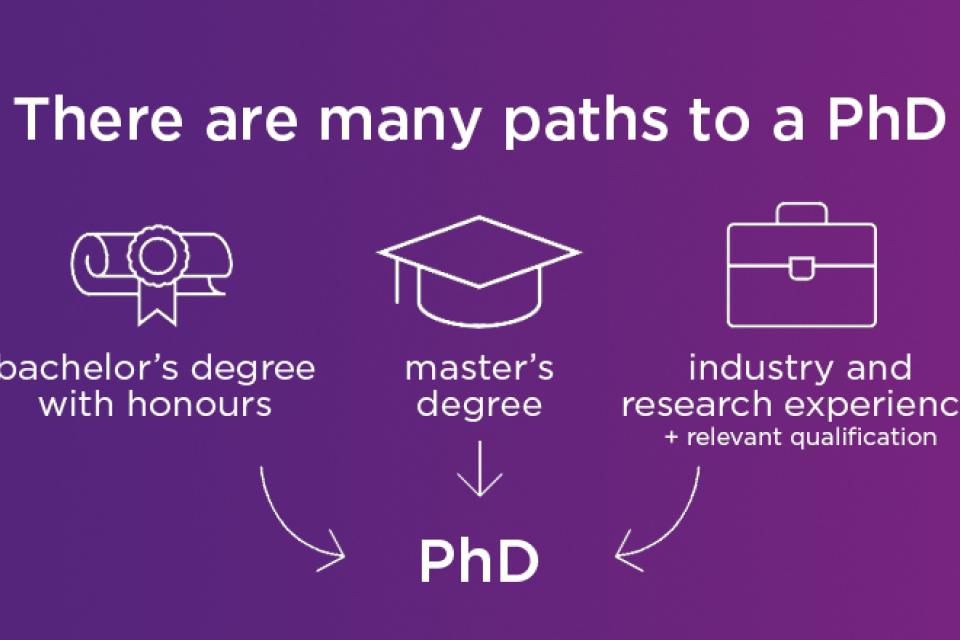
Do you need a master’s for a PhD?
As we said earlier, no – you don’t need a master’s to apply for a PhD. And if you're wondering more specifically ‘is an MPhil required for a PhD?’, the answer is also no. It may make logical sense at face value to complete a Master of Philosophy (MPhil) and then go on to study a Doctor of Philosophy, but in reality, it tends to work a bit differently.
All these types of postgraduate degrees and higher degrees by research can be a little confusing to keep track of, so let’s break it down into simpler terms.
So, here’s how some of the pathways through these degrees work.
- Some students decide to study and complete a Master of Philosophy, as it’s shorter than a PhD but still allows them to delve into a research project and produce a thesis (~40,000 words).
- Other students begin studying an MPhil then find they’d like to take their research further and apply to upgrade to a PhD program, adding a few more years onto their studies and producing an 80,000-word thesis.
- Many students aim big from the get-go and apply directly to a PhD program after having completed either a bachelor’s degree with honours or a master’s by coursework.
This is by no means an extensive list of ways in which you can order your studies; it’s just a few of the most common paths taken by university students interested in postgraduate studies and higher degrees by research.
The benefits of studying a master’s before a PhD
Now we’ve established that you can apply to study a Doctor of Philosophy without a master’s degree, let’s address the next big question: should you? Here are just a handful of the reasons why completing a master’s before moving onto a PhD is generally a good idea:
- It gives you a competitive edge compared to other applicants.
- It will provide you with a taste of what it’s like to conduct long-form research and reveal what it takes to be a good PhD student .
- You'll have a chance to explore a research topic to see if there’s enough scope to turn it into your PhD, or you may find offshoot topics that could be explored in more detail.
- You'll experience what it’s like to work with a supervisor and better understand if this process suits your personality type.
Can I go straight from bachelor’s to PhD?
Yes. Most universities will accept applications from students who have a bachelor’s degree with honours (typically at least IIA) as their highest level of completed study. Some universities may accept a bachelor’s degree without honours but with several years of relevant research experience, or a bachelor’s degree without honours but followed by a relevant graduate certificate or graduate diploma.
As we've emphasised above, there are definite benefits to completing further studies after your undergraduate degree to prepare you for your PhD. It’s understandable that you might want to fast-track your way to your Doctor of Philosophy, but remember that going in as prepared as possible will help you get the most out of your research.
If you don’t want to commit to a master’s program after your undergraduate degree but you still have your heart set on a PhD, talk to your course convener about fitting research units into your study plan during your bachelor’s program. Completing a graduate certificate or diploma following your bachelor’s, with a focus on the research area you wish to pursue with a PhD, will help you get a clearer idea of potential research topics too.
There are opportunities for undergraduate and postgraduate students to apply for one of UQ’s summer and winter research programs . These programs can help to boost your knowledge and skills in research and your field of study – and better prepare you for PhD studies.
When considering whether or not to apply for a PhD without a master’s degree, remember that the process is competitive, and it can take time to find the right supervisor . Having a master’s degree could put you ahead of other applicants and secure you that valued place as a PhD candidate.
Want to know more about how a PhD works? How do you find a supervisor? What are the best tips for writing your proposal? Find answers by reading our comprehensive guide: How to get a PhD.
Share this Facebook Twitter LinkedIn Email
Related stories

How long does a PhD take?
3-minute read
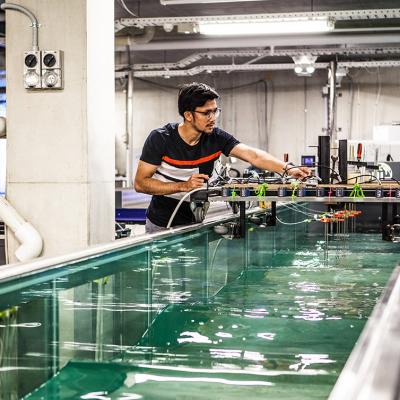
Can I do a PhD while working?
4-minute read

What makes a good PhD student?

How to get a PhD scholarship or funding

Guidance from our top admission experts — for free!

- Admit Finder
Discover Past Admits, Gauge Your Chances!
- Shortlist Builder
Personalized University Picks, Just a Click Away.
- Course Finder
Navigate Global Courses Tailored for You
- Scholarship Finder
Unlock Funding Opportunities Worldwide.

Get tailored study abroad advice.

Sign in for exclusive content!

Planning to study abroad?

Build your target shortlist and see your odds of getting into top schools with Ambitio's AI shortlist builder!

Heading Out Already?
Our Ivy League mentors and top admission experts can help with personalized tips to get you into your dream school
6 September 2023
7 minutes read
PhD without a Masters in the USA: A Comprehensive Guide
Key Takeaways:
- Direct Entry to PhD: Many U.S. universities now offer programs allowing students to pursue a PhD directly after completing their bachelor’s degree, bypassing the master’s.
- Time and Cost Efficiency: This pathway saves time and money, reducing the overall duration and cost of higher education.
- Research Focus: Direct PhD programs emphasize intensive research, allowing students to delve deeply into their field of study from an early stage.
- Stringent Criteria: Admission to these programs is competitive, with a strong emphasis on undergraduate academic performance and research experience.
- Varied by Field: Availability and norms of direct PhD programs can vary significantly across different academic disciplines and universities.
In recent years, a paradigm shift has been evident in the academic landscape. The USA, known for its rigorous academic structure, has begun to adapt and transform. Many universities now offer candidates the chance to pursue a PhD without a master’s degree.
Such an option seems tempting for those looking to save time and dive directly into research. This direct entry, or “bachelor’s to PhD,” program is a welcome change for many aspiring scholars.
Worried about the cost of Studying Abroad?
Sign up to access 25 game-changing scholarships that could cover your costs.

- Why the Sudden Shift?
The educational field is dynamic, and constantly evolving based on societal needs and scientific progress. As global challenges become more complex, there’s a demand for in-depth, specialized research.
This means a longer time spent on research rather than course completion. The direct PhD route facilitates just that – more time on research, and less on course study.
Universities Leading the Way
Several top-tier universities are at the forefront of this transition. For instance, a student aiming for a PhD in Computer Science or Bioengineering might find the direct PhD path available, whereas it might not be the case for someone seeking a degree in History or Philosophy . Always ensure you check specific departmental guidelines.
Stuck on How to Pick Your Ideal College?
Sign up to access your tailored shortlist and simplify finding your ideal college.

- Why Consider a PhD Without a Master’s Degree?
The lure of diving straight into research after an undergraduate program has several enticing advantages.
Duration and Costs
The primary advantage for many is the saved time. Traditionally, students spend two years in a master’s program, followed by 4-6 years for a PhD. By opting for a direct PhD, one might shave off a couple of years from their academic journey. This not only translates to saved time but also reduced tuition and associated costs.
Early Start to Research
Starting research early means a more extended period for deep study and the potential to make significant breakthroughs. Additionally, diving directly into research post-bachelors can lead to early publications, making the candidate’s academic profile stronger.
Admission Criteria: Candidates for direct PhD programs must demonstrate academic excellence, particularly in their major-specific courses, and have significant undergraduate research experience.
See how Successful Applications Look Like!
Access 350K+ profiles of students who got in. See what you can improve in your own application!

- Eligibility and Admission Criteria
Jumping from a bachelor’s program to a PhD isn’t a walk in the park. Admission criteria are often more stringent for direct PhD applicants.
Demonstrating Academic Excellence
Universities typically expect a stellar undergraduate academic record, emphasizing strong grades in major-specific courses. It’s also not just about grades – active participation in relevant seminars, workshops, and other academic events can enhance a candidate’s profile.
Research Experience and Recommendations
An essential criterion is demonstrable undergraduate research experience. Potential PhD candidates must have participated in significant research projects and ideally have some publications or research reports to showcase.
Furthermore, having recommendation letters from known figures in the field or previous research supervisors can considerably strengthen an application.
Program Availability: The availability of direct PhD programs varies across disciplines and institutions. For example, fields like Computer Science and Bioengineering at institutions such as MIT and Stanford offer direct PhD options, while other fields and universities might not.

Start Your University Applications with Ambitio Pro!
Get Ambitio Pro!
Begin your journey to top universities with Ambitio Pro. Our premium platform offers you tools and support needed to craft standout applications.
Unlock Advanced Features for a More Comprehensive Application Experience!

Start your Journey today
- Universities Offering Direct PhD Programs
As the appeal of direct PhD programs grows, many universities across the USA have adopted this approach, allowing students to delve into intensive research immediately after their bachelor’s.
However, the offerings and requirements vary from one institution to another, and often from one department to another within the same university. Here’s an expanded look into some of the universities leading the charge and their specific programs:
Massachusetts Institute of Technology (MIT)
MIT has always been at the forefront of innovation, and its approach to graduate studies is no different. Several departments within MIT allow for a direct PhD pathway:
- Biology: The department seeks candidates with a strong foundation in biology and other sciences. Undergraduate research experience is a significant plus.
- Electrical Engineering & Computer Science: This department often values a blend of academic excellence and demonstrable skills, such as coding or design projects.
Stanford University
Stanford is another top-tier institution where certain departments entertain direct PhD applications:
- Chemistry: Aside from a stellar academic record, the department values candidates with laboratory experience and those who’ve contributed to research publications.
- Physics: A strong foundation in physics, proven through coursework, and undergraduate research, often sets successful candidates apart.
University of California, Berkeley (UC Berkeley)
UC Berkeley has a wide array of programs, some of which allow candidates to transition directly from their bachelors:
- Molecular & Cell Biology: Here, the emphasis is on in-depth knowledge of biology and related disciplines. Candidates with research papers or projects often have an edge.
- Environmental Science, Policy, & Management: This interdisciplinary program values candidates with a broad perspective on environmental issues and ideally some fieldwork or research experience.
Princeton University
At Princeton , the blend of traditional academic values with forward thinking has led to the adoption of direct PhD programs in select departments:
- Mathematics: A profound understanding of advanced mathematics, as well as participation in relevant seminars, workshops, or Olympiads, can be beneficial.
- Neuroscience: The department seeks individuals keen on exploring the frontiers of brain science. Laboratory experience, especially with techniques such as fMRI or electrophysiology, can be a plus.
Caltech (California Institute of Technology)
Caltech , renowned for its research contributions, also offers some direct-to-PhD programs:
- Aeronautics: Candidates with a background in engineering, physics, or applied mathematics and a penchant for aerospace studies stand out.
- Biochemistry & Molecular Biophysics: Those with a deep understanding of chemistry and biology, complemented by laboratory experience, are often favored.
Tips for Aspirants
Before diving into the application process:
- Research Thoroughly: Understand the specific requirements of your desired program and department. Some might prioritize academic grades while others may emphasize research experience.
- Engage with Current Students: Connecting with PhD students can provide a clearer picture of what to expect and how to strengthen your application.
- Seek Guidance: From academic advisors to professors, gathering feedback can fine-tune your application, making it more aligned with what the department seeks.
While the option of direct PhD programs is increasingly available, it’s essential to understand that each university and department will have its specific criteria.
Being well-researched, prepared, and proactive can make a significant difference in the application process. The journey might be intense, but the rewards, both intellectual and professional, are profound.
Your gateway to unlocking premier universities! Effortlessly navigate admissions with personalized support and expert guidance. Enroll now and initiate your success story! Enroll in Ambitio Elite
Need-to-Know Before Applying
Before embarking on the application journey, it’s essential to ensure you’re a good fit. Thoroughly research the program, faculty, available resources, and funding opportunities. Getting in touch with current PhD students or alumni can provide invaluable insights.
- Challenges of a Direct PhD Path
Pursuing a PhD immediately after obtaining a bachelor’s degree is undoubtedly a unique and commendable academic route. While there are significant advantages to this path, it’s not without its hurdles.
Let’s delve deeper into the challenges that candidates may face when choosing a direct PhD path and ways to navigate these challenges effectively:
The Intensity of the Learning Curve
Entering a PhD program straight from an undergraduate degree can be a bit of a culture shock for many:
- Depth Over Breadth: While bachelor’s programs typically offer a broad understanding of a field, PhDs require intense specialization. This transition from a general to a highly specialized focus can be demanding.
- Advanced Coursework: Direct PhD students may find themselves in advanced courses with peers who have a master’s under their belt. This can make the initial semesters particularly challenging as they grapple with complex topics without the cushioning of intermediary subjects.
Adapting to the Research Rigor
PhD programs are research-intensive, which is a significant transition from undergraduate studies:
- Research Autonomy: Unlike structured undergraduate lab exercises, PhD research is often self-directed. This requires independent problem-solving, a skill that takes time to cultivate.
- Publication Pressure: There’s an emphasis on producing publishable results in PhD programs. Navigating the world of academic publishing, from selecting suitable journals to responding to reviewer comments, can be a steep learning curve.
Potential Missed Networking Opportunities
A master’s program is more than just academic coursework. It often provides students with a chance to network and form connections:
- Limited Alumni Connections: Going straight to a PhD might mean you miss out on two sets of alumni networks – one from your master’s and one from your PhD.
- Fewer Peer Collaborations: Master’s programs often involve group projects and collaborations, which can lead to long-lasting professional relationships. Direct PhD candidates might need to be more proactive in seeking such collaborative opportunities.
Social and Emotional Adjustments
The personal adjustments and sacrifices inherent in any PhD program can be particularly accentuated in a direct PhD route:
- Younger Peer Group: Being younger than many of your peers might lead to feelings of isolation or imposter syndrome.
- Lack of Break: Many students use the time between a bachelor’s and a PhD for personal development, travel, or gaining industry experience. Jumping straight into a PhD means you’re back in the academic grind without a significant break.
Navigating Financial Complexities
While getting to the finish line faster might seem cost-effective, there are financial considerations:
- Funding Challenges: Some funding opportunities or scholarships might be tailored specifically for master’s students. Direct PhD students need to be more resourceful in seeking financial support.
- Longer Commitment: If you’re self-funding, remember that a PhD is a long-term financial commitment. Ensure you have a clear understanding of costs and potential financial strain.
Strategies for Overcoming Challenges
- Mentorship: Seek out mentors early on, both within and outside your department. Their guidance can be invaluable.
- Networking: Attend conferences, workshops, and seminars to broaden your network and gain exposure to various facets of your field.
- Self-Care: Recognize the signs of burnout and stress. Engage in activities outside academia to maintain a balanced life.
- Open Communication: Discuss your challenges with your PhD supervisor. They can offer guidance, resources, or even adjust your research load if needed.
Opting for a direct PhD path is a commendable and ambitious decision. However, it’s imperative for candidates to be aware of the potential challenges. With foresight, preparation, and the right support system, these hurdles can be effectively navigated, leading to a rewarding academic journey.
Adjusting to the Research Intensity
A PhD program is undeniably intense. The depth of research, long hours in the lab or library, and the pressure to publish can be overwhelming. Candidates who haven’t experienced the intermediary step of a master’s might find this transition especially taxing.
Networking and Building Relationships
One often overlooked benefit of a master’s program is the networking opportunities it presents. Direct PhD students might need to put in extra effort to establish connections in their field, attend conferences, and collaborate on research.
The prospect of pursuing a PhD without a master’s degree in the USA is both exciting and challenging. It offers a unique pathway for ambitious students eager to delve into research.
However, it’s essential to consider all aspects, from advantages to inherent challenges, before making a decision. Research thoroughly, engage with current students, and reflect on your long-term goals to ensure this path aligns with your academic and professional aspirations.
Schedule Your Expert Call Now: Ready to navigate the college application process with ease? Schedule a call with our mentor at your convenience. We’re here to offer personalized solutions and expert guidance.
Is it common to get accepted into a direct PhD program without research experience?
While it’s possible, it’s relatively rare. Research experience is often a significant criterion for acceptance.
Do all universities in the USA offer a direct PhD after a bachelor’s?
No, while the trend is growing, not all universities or departments offer this option. Always check the specific department’s guidelines.
How can I enhance my chances of acceptance for a direct PhD?
Strengthen your profile with solid undergraduate research, obtain strong recommendation letters, and demonstrate clarity in your research goals through your statement of purpose.
Spread the Word!
Share across your social media if you found it helpful

Table of Contents
- • Why the Sudden Shift?
- • Why Consider a PhD Without a Master’s Degree?
- • Eligibility and Admission Criteria
- • Universities Offering Direct PhD Programs
- • Challenges of a Direct PhD Path
- • Conclusion
Build your profile to get into top colleges
Phone Number
What level are you targetting
Almost there!
Just enter your OTP, and your planner will be on its way!
Code sent on
Resend OTP (30s)

Your Handbook Is Waiting on WhatsApp!
Please have a look, and always feel free to reach out for any detailed guidance
Click here to download
Meanwhile check out your dashboard to access various tools to help you in your study abroad journey

Recent Blogs
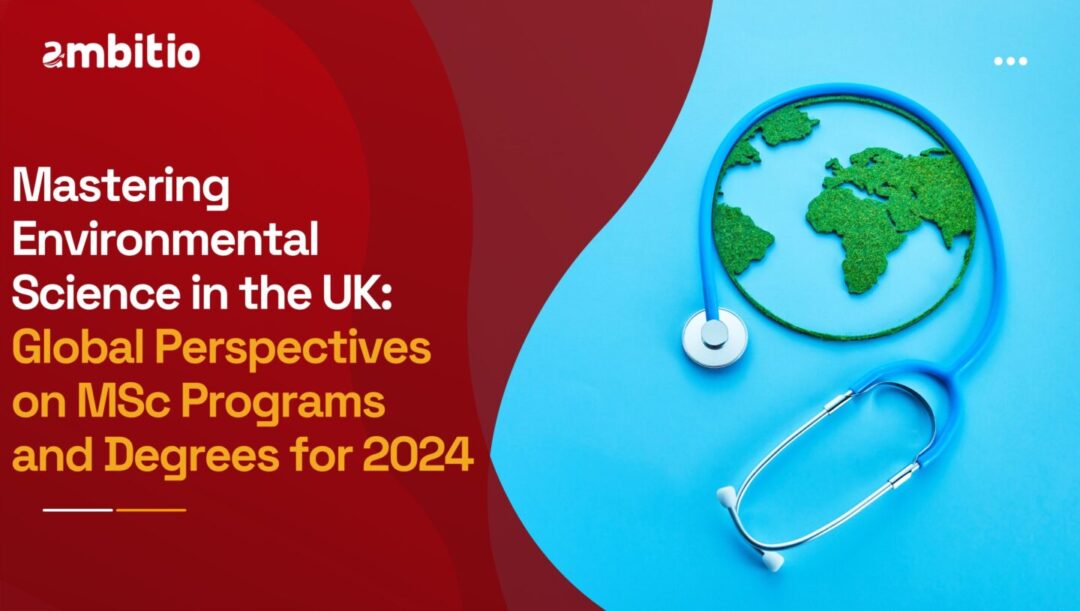
Mastering Environmental Science in the UK: Global Perspectives on MSc Programs and Degrees for 2024
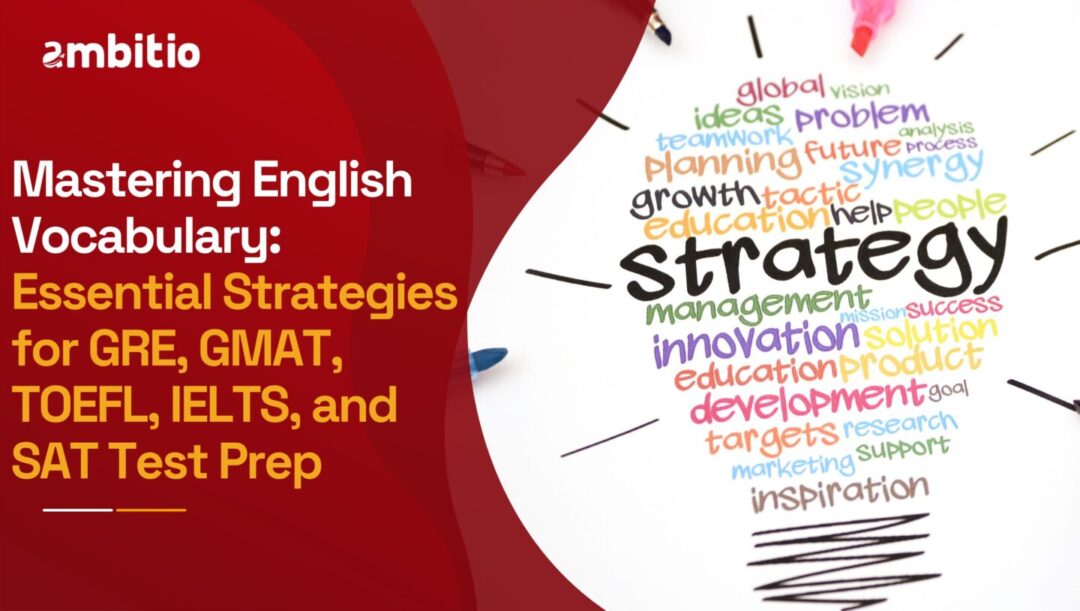
Mastering English Vocabulary: Essential Strategies for GRE, GMAT, TOEFL, IELTS, and SAT Test Prep
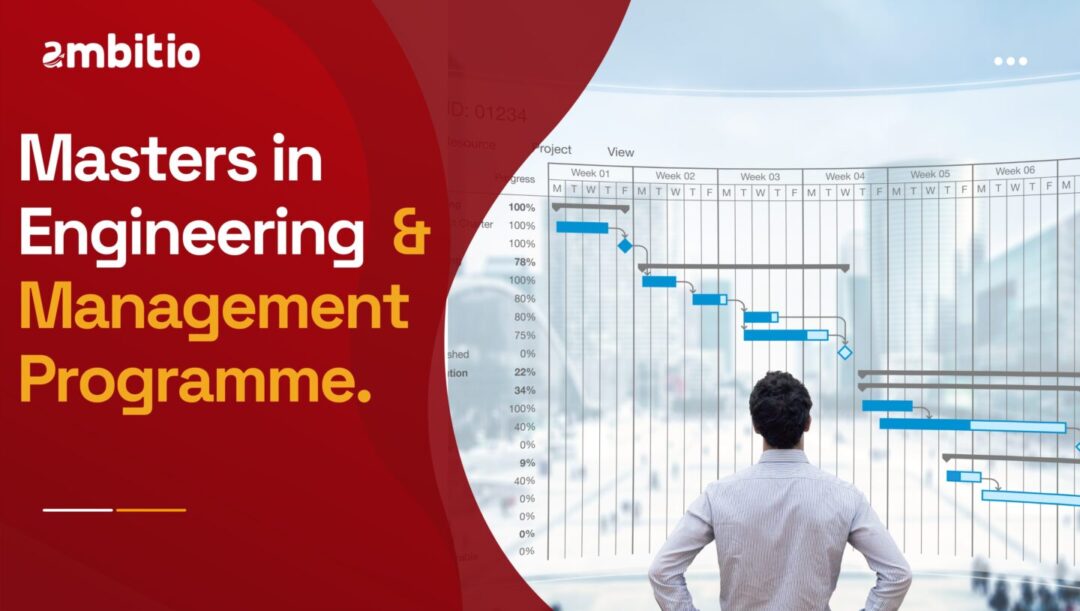
Masters in Engineering Management Programme: Exploring Top Universities, Scholarships, and Colleges for 2024
Find your Dream school now⭐️
Welcome! Let's Land Your Dream Admit.
Let us make sure you get into the best!
- 2024 Winter
- 2024 Spring
- 2024 Summer
Enter verification code
Code was sent to
- Our Experts
Connect with us on our social media
Do You Need a Masters to Get a PhD [2024 Guide]
Do you need a masters to get a PhD? It is possible to earn your PhD without a masters program being completed first. This direct entry bachelor’s to PhD option can be a helpful way to reduce the time and money required to complete your education.

Earning a PhD degree may put you on the path to exciting and rewarding career opportunities in a variety of fields. It may also specifically prepare you for a career in research and teaching.
Editorial Listing ShortCode:
While in many cases it is possible to earn your PhD without a masters, completing a masters program may sometimes be a better fit for your personal educational journey and career objectives.
Do You Need a Masters to Get a PhD?

No, a master’s degree is not always required to earn a PhD. A number of schools may allow you to enroll in a PhD-level program without having previously obtained your master’s degree if you meet the school’s and program’s admission criteria.
In some cases, Ph.D. programs may allow you to skip the need to obtain a master’s degree. These programs allow direct enrollment from a bachelor’s degree program into a PhD or doctorate program. Other schools may offer dual programs. These programs allow you to obtain a master’s graduate degree while you complete coursework for a PhD.
However, a growing number of universities now offer one year masters programs that may be beneficial to you and some of the highest paying masters degrees may be worth exploring before considering direct-entry PhD programs.
The availability of direct entry bachelor’s to PhD programs and dual master-PhD programs may vary from school to school. So, it can be helpful to research specific schools and fields of interest before applying.
Pros and Cons of Earning a PhD Without a Master’s

Earning a PhD without a master’s can offer some unique benefits, but depending on your career goals and personal objectives, it may come with some cons as well.
- Save time . Earning your PhD without a master’s will often save you time, as you won’t need to complete the 1 to 3 years required of a master’s education.
- Save money . Skipping a masters program may also save you money, as you get to avoid the tuition costs of a masters program.
- Enter the workforce more quickly . Attending a direct entry PhD program may allow you to enter the workforce more quickly and achieve advanced positions in your field sooner than other educational routes.
- PhD not always required . Depending on your career goals, a PhD may not be necessary or helpful in achieving your target. In these instances, earning a doctoral degree may simply increase the time it takes for you to begin working in your field of choice.
- Master’s degrees can offer clarity and experience . Earning a master’s may offer perspective in terms of choosing a trajectory for your studies in a PhD program. A master’s also allows you to experience postsecondary studies that are more self-directed than bachelor degree programs.
- Master’s degrees can offer competitive advantage . In some cases, it may be more challenging to compete with other students who have completed a master’s program when it comes to being accepted into a PhD program or competing for certain research topics.
Enrolling in a direct entry bachelors to PhD program may not be right for everyone. It may be a good option for you, though, if you’re interested in obtaining your PhD and finishing your educational journey in less time and at lesser cost.
If you are interested in changing careers and you do decide that a masters degree is right for you, you may want to consider the best master’s degrees for career change that many universities offer their grad students.
Can You Get a PhD Without a Masters?

Yes, you can get a PhD without first obtaining a master’s degree. A number of universities offer direct entry to PhD programs from undergraduate or bachelor degree studies.
In some cases, specific schools or programs may prefer that applicants hold a master’s degree. Other options that may exist are dual master and PhD programs, which are available from certain universities.
Admission criteria to a PhD program will vary from school to school. Criteria may include the completion of an application form, submission of GRE or GMAT scores, payment of an application fee, and a written statement of purpose.
Other criteria for admission to a PhD without masters program could include submission of a resume, letters of reference, and transcripts from previous postsecondary studies, such as your bachelor’s degree.
How Hard Is It to Get into a PhD Program?

Entry requirements for doctorate degrees vary from school to school and across programs.
Some common requirements, though, that you may come across include the completion of a bachelor’s degree program, a letter of interest, and a submission of a CV or resume. Some schools may require you to submit GRE or GMAT scores, but this requirement is becoming less common among accredited programs and institutions.
Once accepted into a PhD program, you may be required to undertake a significant amount of self-directed study and research, complete advanced coursework in your field of study, and fulfill a dissertation requirement.
What Can You Do with a PhD?

According to the Bureau of Labor Statistics , there are a number of rewarding careers that may be available to you with a PhD. Some career fields in which a PhD is valuable include health, education, finance, management, and governance. Postsecondary health education and physical therapy are among the highest paying PhD degrees available.
Some positions that you may qualify for with a PhD include psychologist, economist, postsecondary teacher, political scientist, anthropologist, archeologist, and biochemist. Other positions could include engineer, historian, and chemist.
Understanding what a PhD degree is can help you plan your career goals. It is common for a PhD education to lead to careers in research, where you can contribute to the existing breadth of knowledge and understanding in a particular field. Teaching is another professional area common to PhD graduates, including teaching at universities and colleges.
How Long Does It Take to Get a PhD Without a Masters?

Completing a master’s degree generally takes anywhere from 1 to 2 years, depending on the type of program and attendance schedule.
Obtaining a PhD without a masters degree is a unique opportunity that may allow you to shorten your academic journey. Traditionally, a bachelor’s degree takes 4 years to complete while PhD degrees can take anywhere from 3 to 5 years, depending on the program and school you attend.
Earn Your PhD Online

Earning your PhD online without a master’s may be a beneficial way for you to achieve advanced level education. You may complete a terminal degree in your field of choice while saving time and money. You may also benefit from advancement early in your career.
There are a variety of direct entry and accelerated PhD programs online available from accredited schools. You may find that obtaining your PhD without first earning a master’s degree allows you to enter into your profession of choice much quicker than expected.

Do You Need a Masters To Get a PhD in 2024?
If you have ever considered taking the leap and applying for a PhD, then you know it can be quite a daunting task. Even more challenging is targeting a PhD without masters – after all, isn’t a master’s degree usually the path to take before embarking on doctoral studies?
But let’s be honest; if you’re feeling brave enough to attempt such an ambitious feat, then why let the lack of prior qualifications hold you back? Should you attempt to go after your doctorate without first earning your master’s?
Here we discuss the pros and cons of skipping the master’s step in pursuit of a PhD and how having a master’s degree or not can influence admissions decisions when applying to doctoral programs.
Differences Between Terminal and Non-Terminal Masters Degrees
It’s important to understand that a PhD without masters is not feasible. All PhDs require the completion of a master’s degree first. The question that often arises is whether to enroll in a terminal or non-terminal master’s degree before earning a PhD. What are the differences between the two? A master’s degree is simply terminal or non-terminal, depending on whether or not it leads directly to a PhD.
Terminal master’s degrees are for those who plan to pursue a career in research or academia and provide students with advanced knowledge within a specific subject area via the completion of a thesis or project. Other terminal master’s degrees (the MBA , MPA , or MPP for example) are for professionals who want an advantage in their current field, or those looking to shift careers entirely. They provide students with practical skills that they can apply directly in the workplace. In general, these programs take one to two years to complete.
Non-terminal masters degrees
Non-terminal master’s degrees are part of an existing doctoral program. With employers now looking for candidates that possess highly advanced knowledge in their respective fields, many universities found it necessary to combine their doctoral and master’s programs into one degree to better prepare their graduates for the future workplace. Ultimately, this move towards combining degrees allows universities to better manage their resources by not having to maintain two separate degree programs.
Non-terminal master’s degrees may involve completing coursework and passing an exam to earn the degree. Alternatively, some programs require writing a shorter thesis than what terminal master’s degree programs require. This can help students complete their master’s degree within one year and continue to pursue their doctoral studies.
However, it is important to note that although their goal is to lead graduates back to the job market, terminal master’s degrees are not necessarily the end of the road for many students. Many graduates of terminal master’s degrees end up applying and enrolling in doctoral programs successfully.
So what are the pros and cons of applying to PhD programs with or without a master’s degree? Does having a master’s degree increase your chance of admittance into a PhD program or not?
PhD Without Masters: The Pros
Enrolling in a PhD program without having obtained a master’s degree is becoming increasingly common, and in many cases can be beneficial for those who would like to pursue further education. By skipping the master’s program, students can save time and money by bypassing an additional level of schooling.
Not having to go through the time-consuming process of obtaining a master’s degree with a full thesis cuts down the time it takes to complete the entire program significantly. This allows applicants to pursue their career goals sooner and gain experience in their field faster. This can be especially helpful for those who already have extensive experience or knowledge about their chosen field of study.
Finally, the PhD without masters is less expensive overall since applicants don’t have to pay the additional tuition or fees associated with completing a standalone master’s program. This route is especially beneficial for those students who do not have access to scholarships and other financial aid opportunities. Since many PhD programs are fully funded in the U.S., enrolling in a PhD program without a master’s degree is a great way to reduce costs.
PhD Without Masters: The Cons
While it is possible to apply to a doctoral program without having completed a master’s degree, there are a number of potential disadvantages associated with this approach. One is that holders of a master’s degree often have more background knowledge in the field they wish to pursue at the PhD level, which can lead to superior academic performance and faster completion of the program.
Additionally, universities may set higher standards for applicants who lack a master’s degree and can be less willing to admit them into their doctoral programs because they may lack certain skills or prerequisites needed for successful completion. Many competitive funding sources require applicants to possess a master’s degree to be eligible for grants or fellowships, which could limit opportunities for those who do not hold master’s degrees.
Further insights
In addition, a PhD is a complex and demanding academic program that requires a great deal of dedication, hard work, and research. If you are unsure if academia is really what you want, enrolling in a PhD program without first obtaining a master’s degree can be an unwise decision as you may not understand the full scope of what you’re getting into or have the necessary skills to succeed.
Additionally, since most PhD programs require much time and energy , taking on such an undertaking without having thoroughly thought through one’s career plans could result in wasted resources if you decide that the field isn’t right for you.
Before enrolling in any doctoral program, it is important to carefully consider your long-term career objectives and make sure you have realistic expectations about the work and commitment it will take to complete the program. If your career goals remain uncertain, then taking a master’s degree first might be an appropriate path to explore before deciding whether or not to pursue a PhD.
When Is a PhD Without Masters a Good Idea?
In our opinion, your academic performance and career goals should determine if it is worth it or not to apply directly to doctoral programs without a master’s degree. If your heart is set on becoming an academic, you have already completed an undergraduate honors thesis with high marks, and have a high GPA and excellent standardized test scores ( GRE ), then it may be a good idea to apply directly to a PhD program instead of enrolling in a master’s program.
Your grades and research experience make you competitive and will allow you to compete with other solid applicants.
Additionally, if you already have a clear vision of your research goals and the potential impact your project can make on the field, skipping a master’s program and going straight into a doctoral program could be beneficial by allowing you to finish earlier and become the professor you were meant to be!
When Is a PhD Without Masters a Bad Idea?
If your grades are less than stellar and if you are unsure about your academic career plans, then enrolling in a terminal master’s degree is a great option to simultaneously upgrade your profile as an applicant and provide you the opportunity to explore the world of research a little bit more before the plunge into doctoral studies
Earning a master’s degree before applying to a PhD program is a great way to increase your academic credentials. If you have a so-so undergraduate GPA , acing your master’s degree classes is a great way to offset your undergraduate academic performance. It will not only boost your GPA, but also make up for eventual lower standardized test scores.
Having a master’s degree does not guarantee admission to a doctoral program, but it can influence admissions decisions and make it easier for someone to be admitted into the program. Many doctoral programs prefer applicants who already hold a master’s degree because they have had the opportunity to refine their research skills, develop their knowledge in a specific area of study, and gain additional experience working in the field.
For example, the thesis project involved in a master’s program provides the opportunity to delve deeper into a particular field that you’re interested in. It’s a good way to ensure that both research-based work and your chosen field of study are suitable for you before committing to a PhD that may take several years to complete. Another benefit of pursuing a master’s degree thesis project is that it provides the chance to collaborate closely with a supervisor.
This experience can help you grasp the ideal communication frequency and student-supervisor dynamic involved in pursuing a PhD. You can use this new knowledge to find the most appropriate supervisor for your PhD project application.
Bottom Line
Ultimately, when deciding whether to pursue a master’s degree during your doctoral studies, it is important to assess the practicality of its application. There are advantages and disadvantages in either scenario; those already holding a master’s may find themselves more prepared for the application process than those without one.
Whichever route you choose, be sure to do your research thoroughly and understand the admissions process before diving head-first into the program of your choice. Keep in mind that resources like our graduate school application services exist to help make this step easier.
So don’t be afraid to reach out and get the support you need! With dedication and hard work, you can achieve whatever goals you set for yourself. Next time you’re considering skipping a master’s program in your pursuit of a PhD, remember that no feat is too great if you stay focused and don’t lose sight of your ambitions! Got questions? Sign up for a consultation . It’s FREE!
With a Master’s from McGill University and a Ph.D. from New York University, Dr. Philippe Barr is the founder of The Admit Lab . As a tenure-track professor, Dr. Barr spent a decade teaching and serving on several graduate admission committees at UNC-Chapel Hill before turning to full-time consulting. With more than seven years of experience as a graduate school admissions consultant, Dr. Barr has stewarded the candidate journey across multiple master’s and Ph.D. programs and helped hundreds of students get admitted to top-tier graduate programs all over the world .
Subscribe to my YouTube Channel for weekly tutorials on navigating the PhD application process and live Q&A sessions!
Share this:
Join the conversation.
- Pingback: Average Age of PhD Student: How Old Is Too Old? - The Admit Lab
- Pingback: Average Age of PhD Student: How Old Is Too Old? | Development Mi
- Pingback: Getting a PhD Without Research Experience -
- Pingback: PhD Admissions Secrets Revealed -
Leave a comment
Leave a reply cancel reply, discover more from admit lab.
Subscribe now to keep reading and get access to the full archive.
Type your email…
Continue reading

Research Voyage
Research Tips and Infromation
PhD without a Master’s Degree? Exploring Direct PhD Programs
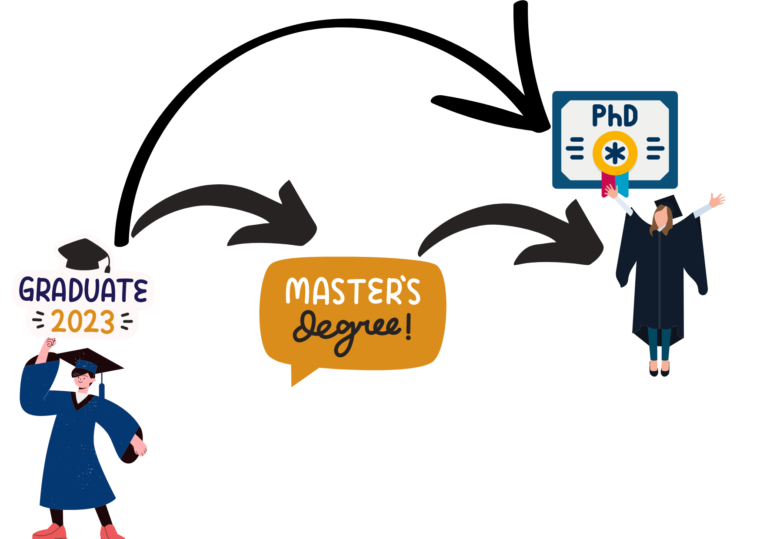
Introduction
What is a direct phd program.
- Pros of Doing a PhD Without a Master's Degree
- Cons of Doing a PhD Without a Master's Degree
- Fields in Which it is More Common to Enter a PhD Program Without a Master's Degree
- Fields in Which a Master's Degree is Often Required for Admission to a PhD Program
- How to Apply for a PhD Program Without a Master's Degree
- Examples of Successful PhD students who did not have a Master's Degree
- Top Universities Offering PhD without Master's Degree
Direct PhD Programmes in United States:
Direct phd programmes in europe:, direct phd programmes in australia:, direct phd programmes in asia:.
During my teaching years at a premier Engineering institute in India, I encountered an intriguing case that shed light on the possibility of pursuing a PhD without a master’s degree.
One day, a former student reached out to me with exciting news. She had successfully cleared the Graduate Aptitude Test in Engineering (GATE), a qualifying exam for admission to postgraduate programs. Even more surprising was her plan to directly join the PhD program at the prestigious Indian Institute of Technology (IIT) Delhi.
Initially, I found this puzzling—how could one step into a PhD without completing a master’s degree? It turned out that such programs do indeed exist at IITs and other esteemed institutions in India and abroad.
Intrigued by this revelation, I delved deeper into the details and later shared this valuable information with many students. Little did I know that this piece of knowledge would significantly benefit aspiring scholars aiming for a direct PhD path.
A PhD, or Doctor of Philosophy, is the highest level of academic degree that one can achieve in many fields. It typically involves several years of intensive research and coursework in a specialized area and completing a dissertation that makes an original contribution to the field. A PhD can lead to many career opportunities, including positions in academia, industry, and government.
The traditional path to a PhD usually involves completing a bachelor’s degree in a related field, followed by a master’s degree before starting the PhD program. The bachelor’s degree provides a broad foundation in the field, while the master’s degree provides more specialized training and research experience that prepares students for the rigours of a PhD program.
However, some students may wonder whether it is possible to skip the master’s degree and go straight into a PhD program. This can be an attractive option for students who want to save time and money, or who have extensive research experience that makes them well-prepared for a PhD program.
In this article, we will explore the pros and cons of doing a PhD without a master’s degree, as well as some examples of successful PhD students who took this route.
A direct PhD program, sometimes referred to as an integrated or combined PhD program, is a doctoral-level academic program that allows students to pursue a PhD degree without first obtaining a master’s degree.
In traditional PhD programs, students typically complete a master’s degree before embarking on their doctoral studies. However, in a direct PhD program, students are admitted directly into the PhD program after completing their undergraduate studies.
Direct PhD programs are often structured to be more streamlined, allowing students to move directly into advanced research and coursework related to their field of study. These programs are typically designed for highly motivated and academically strong students who demonstrate exceptional potential for research and scholarly work.
The specific structure and requirements of direct PhD programs can vary depending on the university and the field of study. In some cases, students may be required to complete additional coursework or examinations to ensure they have the necessary background knowledge and skills for doctoral-level research. However, the overall goal of these programs is to accelerate the process of earning a PhD by allowing students to begin their doctoral studies earlier in their academic career.
Pros and Cons of Doing a PhD Without a Master’s Degree
While it is possible to pursue a PhD without completing a master’s degree, there are several potential advantages and disadvantages to consider.
Pros of Doing a PhD Without a Master’s Degree
- Saving time and money: Completing a master’s degree can add two or more years to the time it takes to earn a PhD, as well as significant tuition costs. Skipping the master’s degree can allow students to complete their PhD more quickly and with fewer expenses.
- Gaining more research experience: Some students may already have extensive research experience, either through undergraduate research opportunities or work in a related field. Skipping the master’s degree can allow these students to continue building on their research skills and contribute to the field more quickly.
Cons of Doing a PhD Without a Master’s Degree
- Lack of preparation in research methodology and theory: Master’s degree programs often provide students with more specialized training in research methods and theoretical frameworks, which can be valuable preparation for a PhD program. Skipping the master’s degree can mean missing out on this preparation and potentially struggling to keep up with the demands of a PhD program.
- Potential challenges in meeting admission requirements: Some PhD programs may require applicants to have a master’s degree or equivalent research experience, which can make it difficult for students who have not completed a master’s degree to be accepted into a PhD program. Additionally, some students may need to complete additional coursework or exams to meet the admission requirements for a PhD program.
- A student who completed a bachelor’s degree in computer science and spent several years working in the industry as a software developer may have gained extensive research experience in a specialized area of computer science. This student may be well-prepared to pursue a PhD in computer science without completing a master’s degree.
- A student who completed a bachelor’s degree in psychology and has some research experience through undergraduate research opportunities may struggle to keep up with the demands of a PhD program in psychology without completing a master’s degree that provides more specialized training in research methods and theoretical frameworks.
Fields in Which it is More Common to Enter a PhD Program Without a Master’s Degree
While it is not uncommon for students to pursue a master’s degree before starting a PhD program, there are some fields where it is more common for students to enter a PhD program directly after completing a bachelor’s degree. These fields include:
- Engineering: In many engineering disciplines, it is common for students to enter PhD programs directly after completing a bachelor’s degree. This is because engineering programs often provide students with extensive research experience and specialized training in research methods and theoretical frameworks that prepare them for a PhD program.
- Natural Sciences: In fields such as biology, chemistry, and physics, it is also common for students to enter PhD programs directly after completing a bachelor’s degree. This is because these fields often require extensive research experience and specialized training in laboratory techniques and scientific methods, which students can gain through undergraduate research opportunities and coursework.
In these fields, students who have completed a bachelor’s degree and have extensive research experience may be well-prepared to pursue a PhD program without completing a master’s degree. However, it is important to note that this may not be the case in other fields, such as the social sciences or humanities, where a master’s degree may be more commonly required or preferred for admission to a PhD program.
It is important for students to research the admission requirements and expectations for PhD programs in their chosen field before deciding whether to pursue a master’s degree or apply directly to a PhD program after completing their bachelor’s degree.
Fields in Which a Master’s Degree is Often Required for Admission to a PhD Program
While it is possible to pursue a PhD without completing a master’s degree, there are some fields where a master’s degree is often required or preferred for admission to a PhD program. These fields include:
- Humanities: In fields such as history, philosophy, and literature, it is common for students to complete a master’s degree before applying to a PhD program. This is because these fields often require extensive coursework and training in research methods and theoretical frameworks, which students can gain through a master’s degree program.
- Social Sciences: In fields such as psychology, sociology, and political science, a master’s degree is often required or preferred for admission to a PhD program. This is because these fields often require specialized training in research methods and statistical analysis, which students can gain through a master’s degree program.
In these fields, students who have completed a bachelor’s degree but do not have a master’s degree may find it difficult to gain admission to a PhD program. This is because PhD programs in these fields often have high admission standards and may require applicants to have completed a master’s degree or equivalent research experience.
- A student who completed a bachelor’s degree in English literature and has some research experience through undergraduate research opportunities may need to complete a master’s degree in order to gain admission to a PhD program in literature. This is because PhD programs in literature often require extensive coursework and training in research methods and theoretical frameworks.
- A student who completed a bachelor’s degree in psychology and has some research experience through undergraduate research opportunities may be able to apply directly to a PhD program in psychology. However, some PhD programs in psychology may require applicants to have completed a master’s degree or equivalent research experience, which could make it difficult for this student to gain admission without completing a master’s degree.
How to Apply for a PhD Program Without a Master’s Degree
While it can be challenging to gain admission to a PhD program without a master’s degree, there are some steps that students can take to increase their chances of success. These steps may include:
- Demonstrating exceptional academic qualifications: Students who have completed a bachelor’s degree with exceptional grades and have a strong academic record may be more likely to be considered for admission to a PhD program without a master’s degree.
- Demonstrating research potential: Students with extensive research experiences, such as through undergraduate research opportunities or independent research projects, can demonstrate their potential for success in a PhD program.
- Completing additional coursework or exams: Some PhD programs may require applicants without a master’s degree to complete additional coursework or exams to demonstrate their readiness for PhD-level work. This may include completing additional courses in research methods, statistics, or theory, or taking qualifying exams to demonstrate mastery of the field.
- A student who completed a bachelor’s degree in physics with exceptional grades and extensive research experience may be able to gain admission to a PhD program in physics without completing a master’s degree. This is because the student has demonstrated exceptional academic qualifications and research potential.
- A student who completed a bachelor’s degree in history and has some research experience through undergraduate research opportunities may need to complete additional coursework or exams to gain admission to a PhD program in history. This is because PhD programs in history often require extensive coursework and training in research methods and theoretical frameworks, which students may not have gained through their undergraduate studies alone.
It is important for students to research the admission requirements and expectations for PhD programs in their chosen field before deciding whether to pursue a master’s degree or apply directly to a PhD program after completing their bachelor’s degree. Students may also want to reach out to professors and advisors in their field to discuss their options and receive guidance on the application process.
Please visit my article on “How to Build a Strong Research Portfolio in 07 Easy Steps” . This article will help you in building a strong research portfolio. Visit my blog post sections on writing research papers for journals and writing research papers for conferences . These articles will help you in writing quality papers for journals and conferences.
Examples of Successful PhD students who did not have a Master’s Degree
While it is less common for students to enter a PhD program without a master’s degree, there are examples of successful PhD students who have done so. These students have demonstrated exceptional academic qualifications, research potential, and perseverance in their programs. Some examples of successful PhD students who did not have a master’s degree include:
- Dr. Jennifer Doudna: Dr. Doudna is a biochemist who won the Nobel Prize in Chemistry in 2020 for her work on the CRISPR-Cas9 gene editing system. She entered a PhD program in biochemistry at Harvard University directly after completing her bachelor’s degree at Pomona College. She completed her PhD in just four years and went on to a successful career in academia and research.
- Dr. Maryam Mirzakhani: Dr. Mirzakhani was a mathematician who won the Fields Medal, often considered the highest honour in mathematics, in 2014. She completed her bachelor’s degree in mathematics in Iran and then entered a PhD program in mathematics at Harvard University without completing a master’s degree. She completed her PhD in just three years and went on to a successful career in academia and research.
- Dr. David Gelernter: Dr. Gelernter is a computer scientist and artist who completed his bachelor’s degree in mathematics and classical Hebrew literature at Yale University. He then entered a PhD program in computer science at the same institution without completing a master’s degree. He completed his PhD in three years and went on to a successful career in academia and research.
These examples demonstrate that it is possible for students to succeed in PhD programs without completing a master’s degree. However, it is important to note that these students had exceptional academic qualifications, research potential, and perseverance and that their success was not guaranteed.
Students who are considering applying to PhD programs without completing a master’s degree should carefully consider their own academic qualifications and research potential and should seek guidance and support from advisors and mentors in their field.
Top Universities Offering PhD without Master’s Degree
While it is less common for universities to offer PhD programs without a master’s degree, there are some prestigious institutions around the world that do accept students into PhD programs without a master’s degree in certain fields. Here are some examples:
- Harvard University, USA : Harvard’s Graduate School of Arts and Sciences allows exceptional students to apply directly to their PhD programs without a master’s degree in fields such as physics, chemistry, mathematics, and computer science.
- Stanford University, USA : Stanford’s School of Engineering offers a direct PhD program for exceptional students in fields such as electrical engineering, computer science, and mechanical engineering, without requiring a master’s degree.
- University of Cambridge, UK : The University of Cambridge’s PhD programs in sciences and engineering fields may admit students without a master’s degree on a case-by-case basis, considering their qualifications and research potential.
- Imperial College London, UK : Imperial College London’s PhD programs in engineering and physical sciences may admit students directly from a bachelor’s degree, based on their qualifications and potential for research.
- ETH Zurich, Switzerland: ETH Zurich, a leading institution in science and engineering, may admit students into their PhD programs without a master’s degree, considering their academic achievements and research potential.
- IIT Delhi, India : a leading institution in engineering, admit students into their PhD programs without a master’s degree, considering their academic achievements and research potential.
It’s important to note that the admission requirements and policies for PhD programs without a master’s degree can vary by institution and field of study and may be subject to change. It’s always recommended to thoroughly research and review the specific requirements of each institution and program you are interested in, and contact the admissions offices for up-to-date and accurate information.
Direct PhD Offered in Various Continents/Countries
- Massachusetts Institute of Technology (MIT)
- California Institute of Technology (Caltech)
- Stanford University
- Harvard University
- Princeton University
- University of Cambridge (UK)
- University College London (UK)
- ETH Zurich (Switzerland)
- Technical University of Munich (Germany)
- University of Amsterdam (Netherlands)
- Australian National University
- University of Melbourne
- University of Sydney
- University of Queensland
- Monash University
- National University of Singapore
- Tsinghua University (China)
- University of Tokyo (Japan)
- Seoul National University (South Korea)
- Indian Institutes of Technology (IITs) – Various campuses in India
These universities, among many others, offer direct PhD programs across a wide range of disciplines including engineering, natural sciences, social sciences, humanities, and more. It’s important to research each program carefully to understand its specific requirements, application process, and available funding opportunities.
Pursuing a PhD without a master’s degree is possible but it is less common and comes with its own set of challenges. In this article, we have discussed the pros and cons of doing a PhD without a master’s degree, fields in which it is more common to enter a PhD program without a master’s degree, and fields in which a master’s degree is often required for admission to a PhD program. We have also provided some advice on how to apply for a PhD program without a master’s degree and shared examples of successful PhD students who did not have a master’s degree.
For students who are considering pursuing a PhD without a master’s degree, it is important to carefully consider their academic qualifications and research potential. They should also seek guidance and support from advisors and mentors in their field, and consider completing additional coursework or exams to prepare for the rigors of a PhD program.
In conclusion, the decision to pursue a PhD without a master’s degree is a personal one and should be made after careful consideration of the individual’s goals, strengths, and weaknesses. We encourage readers to engage with the topic further by researching specific PhD programs and seeking advice from mentors and advisors in their field.
Upcoming Events
- Visit the Upcoming International Conferences at Exotic Travel Destinations with Travel Plan
- Visit for Research Internships Worldwide

Recent Posts
- How to Get Off-Cycle Research/Academic Internships
- How to End Your Academic/Research Internship?
- PhD or Industry Job? A Comprehensive Career Guide
- Post Doc Positions in India
- 04 Reasons for Outsourcing Academic Conference Management
- All Blog Posts
- Research Career
- Research Conference
- Research Internship
- Research Journal
- Research Tools
- Uncategorized
- Research Conferences
- Research Journals
- Research Grants
- Internships
- Research Internships
- Email Templates
- Conferences
- Blog Partners
- Privacy Policy
Copyright © 2024 Research Voyage
Design by ThemesDNA.com

- Graduate School
Is it Possible to Get a PhD Without a Master’s Degree?
Featured Expert: Dr. Abha Sood, PhD
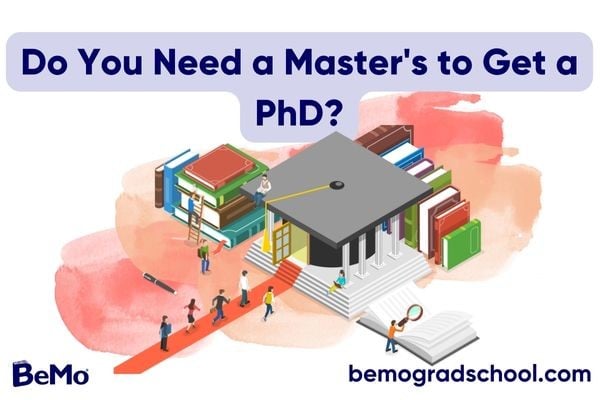
Do you need a master’s to a get a PhD? No! A master’s degree is not a universal requirement for all PhD programs, and there are some types of programs which waive the master’s degree. If you’re interested in how to get a PhD but you want to shorten the time it takes to graduate, you do have options. While they are not numerous, there are excellent, accredited PhD programs in almost every field which do not require a master’s degree. In this blog, learn how you can get a PhD without a master’s, what your program options are and what you need to do to get accepted.
>> Want us to help you get accepted? Schedule a free strategy call here . <<
Listen to the blog!
Article Contents 9 min read
Do you need a master’s to get a phd.
The short answer: No . It is possible to get a PhD without a master’s degree, as there are programs which accept applicants who have not completed a master’s degree first.
We’ll explore these in more detail below, but first we’ll look at whether a PhD is the right path for you and why you might want to skip the master’s.
If you’re weighing your options for graduate school and deciding between a master’s or PhD , you’re probably wondering which one is the best choice for you and how to complete your studies in the fastest way possible. If your end goal is a PhD, you might be looking at a very long educational commitment. How long does it take to get a PhD? On average, 4-7 years, and this timeline doesn’t include the time it takes to get a master’s degree, another 1 or 2 years.
Chances are, you’ve finished 4 years of an undergraduate degree or you’re still earning your bachelor’s degree and thinking ahead a few years. The idea of 5+ more years of schooling can be a little intimidating, so you may be wondering how to get a PhD without a master’s.
There are few different types of PhD programs that do not require a master’s degree first. Note that all of these programs DO require a complete bachelor’s degree to apply! We’ll explain what your options are for completing a PhD without a master’s below.
1. Direct Entry PhD Programs
Direct Entry PhD programs allow students with a Bachelor’s degree to apply directly for a PhD in their field, without first completing a master’s degree. They are typically 4-5 years long, so they are appealing for students who want to earn a graduate degree and shave a few years off their timeline to graduation. Many of the top colleges in the US and the universities in Canada offer these types of programs. However, these programs are far from the easiest PhD programs to get into ! They are quite competitive and require specific admission requirements you’ll need to meet in order to be considered.
2. Online PhD Programs
Online PhD programs are growing in both number and popularity. Online PhD programs offer students greater flexibility while also shortening the time it takes to get a PhD. Most online PhD programs are between 2 and 3 years, although there are 4-year programs and even 1-year online PhD programs out there. Depending on your area of study, an online PhD may not be an option, but there are fully accredited options out there. And, some online PhD programs don’t require a master’s degree.
Curious about whether a Master’s or PhD is right for you? Check out this video:
Direct Entry PhD Programs
Direct entry PhD programs can be a great option for students who want to jump straight from a bachelor’s degree to a PhD. This type of program is available in almost all disciplines, including business, computer science, education and nursing. These are also sometimes called accelerated PhD programs, designed to be 4-5 years and on your way to graduation sooner. As long as you meet all the admission requirements, you can apply to direct entry PhD programs without a master’s degree.
Universities with Direct Entry PhD Programs
Here are a few examples of top universities with direct entry PhD programs. This is not an exhaustive list, as there are many similar programs across the US and Canada!
Pros and Cons of Direct Entry PhD Programs
Since direct entry PhD programs accept students with a bachelor\u2019s degree only, the admission standards are naturally a little higher. Your academic record needs to be above average, and the minimum GPA to apply is usually 3.0 or even higher in some cases. On top of a stellar GPA, you also need to write the GRE, complete an application package and demonstrate you are ready for intense graduate level study without having completed a master\u2019s degree. ","label":"Cons","title":"Cons"}]" code="tab1" template="BlogArticle">
Admission Requirements for Direct Entry PhD Programs
Along with the usual PhD admission requirements, direct entry PhD programs may only admit students with only a bachelor’s degree if they demonstrate exceptional academic ability and extensive prior research experience. Here are some of the additional requirements you can expect for direct entry PhD programs:
- 4-year undergraduate degree (minimum GPA may be required)
- GRE (or GMAT, program-dependent)
- Research Experience
- Previous publications
- Excellent letters of recommendation
- Letter of Intent
- Research interest statement
- Grad school career goals statement
- Research Proposal
- Grad school interview
There are dozens of different online PhD programs out there, ranging from 1 to 4 years long. The length of time it takes to complete an online PhD program depends on the discipline. Online PhD programs are more common in fields like nursing, health sciences, business, education, criminology, engineering and computer science, though there are many more.
Many online PhD programs also have a hybrid learning option, where students can learn both online and in-person at the university. This gives you a little more flexibility and allows you to get the best of both worlds from an online PhD and a traditional one.
Online PhDs are also a good option if you want to do a PhD without dissertation or thesis, since a few of them don’t require it.
Universities with Online PhD Programs
Here’s a short list of universities that offer online PhD programs, but keep in mind there are many more out there.
Pros and Cons of Online PhD Programs
Lack of funding and networking : 100% online programs of course, lack the opportunities for in-person interaction and have fewer opportunities for professional networking in your field. There\u2019s also fewer funding options for online PhDs, if the program is not fully funded. ","label":"Cons","title":"Cons"}]" code="tab2" template="BlogArticle">
Admission Requirements for Online PhD Programs
Online PhD programs, or hybrid programs, will have the same admission requirements as most graduate school programs. On top of these, you will typically need a GPA of 3.0 and above, and you may need to complete specific prerequisite coursework.
The specific admission requirements will vary a little by program, but in general there won’t be anything unexpected.
If you’re thinking of applying to a PhD without a master’s degree, there are pros and cons to this decision. You may be wondering if not having a master’s degree will hurt your chances of getting accepted to a PhD program, or if it affects your chances of finding a job after graduate school.
While you can certainly choose to skip the master’s and still achieve your career goals with a PhD only, you should carefully consider your decision before you start applying to be sure it’s the right path for you.
Before you dive into PhD applications, consider the following things:
1. A PhD might not be necessary
Earning a PhD might not actually be necessary or especially helpful to achieving your career goals. A PhD is a research-focused, academic pursuit, so if your aim is to transition from academia to industry or find an industry job after a PhD , you might benefit more from earning years of work experience rather than years of education. There is always a possibility to pursue a PhD after a few years of working in your field if you change your mind.
In other cases, a master’s degree might give you the better mix of education and skill to achieve your career goals. And, a master’s degree is shorter and less expensive than a PhD, not to mention less competitive to get into.
On the other hand, if you are a true academic and want to find a job in academia , fast-tracking your PhD is a good way to do so!
2. A Master’s degree can give you a competitive edge
Having a master’s degree can actually give you a competitive edge for getting into some PhD programs. For example, even a direct entry PhD program that considers exceptional undergraduate students might give preference to a student with a full master’s degree if there is limited space in a program. Not to mention, not all PhD programs accept you without a master’s degree, and the ones that don’t require one will be more challenging to get into.
Completing your master’s first can also give you better and more funding opportunities for your PhD, if your program is not fully funded, since some scholarships and loans are only open to current graduate students.
3. A PhD is a huge commitment
Getting your PhD is a huge commitment of both your time and money, so you need to be certain it is the right choice for you before you put in the effort of applying and completing a program. Jumping from a bachelor’s right into an advanced graduate program is a big shift in the level of academic rigor and expectations, and not every student will be prepared for it.
Undergraduate students normally will not have the research experience or professional skillset that you would develop throughout the course of a master’s program. So the adjustment to a PhD program may prove to be too big a gap.
A master’s program is a sort of test-drive for graduate school study, introducing you to a higher level of education, research and learning. It’s also shorter and less expensive. So, you may not lose a much from changing your mind and dropping out of a master’s program as you will dropping out of a PhD.
Keep in mind that if you want to pursue advanced study in a new field or change jobs after working as an undergraduate, it will be difficult to find a PhD program that will accept you without a master’s degree.
Do you need a master’s to get a PhD? No, it is not strictly necessary. However, there are some advantages to earning your master’s degree first, and the path from bachelor’s straight to PhD is a little more challenging.
For those who are willing to commit and put in the hard work, the benefits of fast-tracking your PhD are definitely worth it, but you should carefully explore all your options and be sure of what requirements you need to meet first.
No. It is possible to get a PhD without a master’s degree. Some PhD programs accept exceptional students with a bachelor’s degree or allow you to earn a master’s and PhD in a combined, accelerated program.
While it is possible to skip your master’s and go straight to a PhD, you should consider what the options are, what the admission requirements are and whether graduate school is the right choice for you. Earning a PhD is a big commitment, so you need to be sure it’s a worthy pursuit!
Yes, direct entry PhD programs are highly competitive and the admission standards are usually quite high. These types of programs usually accept exceptional students who stand out from the crowd.
The shortest PhD programs are 1-year online degrees. While there are not many available, it is possible to earn a PhD in select fields, completely online, in around 12 to 18-months.
Traditional PhDs take between 4-8 years to complete. Direct entry PhD programs are usually 4-5 years, and online or hybrid PhDs can be between 2-3 years.
Yes, there are dual degree programs that allow you to earn a master’s alongside a PhD, shortening the traditional timeline and saving a bit on tuition costs.
A master’s degree is a graduate program that focuses on teaching you practical, career-related skills and knowledge. It’s designed for you to learn more advanced skills in your field so you can potentially increase your earnings in the workforce and pursue higher-level positions. A PhD is a heavily research-focused graduate degree. PhD students contribute new knowledge to their field through critical research and writing.
It can be tough to decide whether to stop at a master’s degree or go forward and pursue a PhD. The decision will come down to your personal choice, the requirements for your chosen career or position, your budget, timeline, and whether you feel you can and want to commit to extensive graduate studies.
Want more free tips? Subscribe to our channels for more free and useful content!
Apple Podcasts
Like our blog? Write for us ! >>
Have a question ask our admissions experts below and we'll answer your questions, get started now.
Talk to one of our admissions experts
Our site uses cookies. By using our website, you agree with our cookie policy .
FREE Training Webinar:
How to make your grad school application stand out, (and avoid the top 5 mistakes that get most rejected).
Time Sensitive. Limited Spots Available:
We guarantee you'll get into grad school or you don't pay.
Swipe up to see a great offer!

The Savvy Scientist
Experiences of a London PhD student and beyond
Can You Get a PhD Without a Master’s?

If you’re currently studying for your bachelor’s degree and are interested in doing a PhD, you may be wondering: can you get a PhD without a master’s?
The Benefits of Doing a Master’s Degree Before a PhD
A master’s degree allows someone to gain additional skills, research experience and domain-specific knowledge. When a supervisor is looking for potential PhD students, amongst other things they want to see that a candidate has:
- Interest in the subject
- Research experience
- Subject knowledge
Suitability for a PhD does not always require a master’s . But it is a convenient way to provide evidence for your suitability and commitment to research.
Therefore from a supervisor’s perspective, a master’s can provide evidence of these attributes. Having a master’s gives a little more assurance for the supervisor that you’re prepared for the work involved with a PhD. But not having a master’s absolutely does not have to be a barrier!
Already carried out a long research project as part of your bachelor’s degree and want to do a PhD in an area you have knowledge in? You may be able to convince a supervisor that you’re already prepared.
A few less substantial reasons people sometimes consider doing a separate master’s are:
- If for any reason your performance during the bachelor’s degree wasn’t ideal, doing a separate master’s provides another qualification to be assessed against.
- If you’re transitioning to a different research area it is the obvious way to gain knowledge.
- A chance to experience another [potentially more prestigious*] university.
My experience: Early on in your undergraduate degree and interested in doing a PhD? I thoroughly recommend getting as much research experience as possible. Even if you don’t have the opportunity to undertake much research during your course, UROPs are a fantastic way to spend your summer. During my PhD I had help from a few UROP students. One of them has even co-authored a paper with me. I wish that I had done one as an undergraduate!
*I really dislike the idea of considering the prestige of a university and the associated meritocracy , but sadly there is no getting away from the fact that it boosts career prospects.
So Can You Get a PhD Without a Master’s?
If you’re starting to look at PhDs and don’t yet have a master’s, there are two things you can do to get an idea of whether or not you’re likely to need a master’s first:
Check Advertised PhDs
Looking at a PhD advert such as via FindAPhD.com? Check the listed candidate requirements on the advertisement.
Sometimes a master’s isn’t mentioned:

Sometimes doing a master’s is a suggested advantage:

Here is a post detailing how you can find available PhD projects .
Ask the Academic
The most definitive answer you’ll receive for whether you can get a PhD without a master’s will be by contacting supervisors directly.
Often as soon as you start a conversation with potential supervisors they’ll ask to look over a copy of your CV. There is nothing wrong with being bold and checking whether you’re currently qualified enough to stand a competitive chance of getting a PhD.
My experience: When I was considering PhDs I emailed an academic saying I was interested in applying for a project with them but was worried I didn’t have relevant experience. Within 24 hours he had replied saying “Unfortunately, I’m not confident that you’d be selected if you applied as other candidates who have expressed an interest in applying had more relevant experience” Although disappointing, it’s much better to find this out quickly so that you can move on. I already had a master’s but not in a relevant area. If I’d desperately wanted to pursue this research area an obvious means to transition across and gain experience would have been with a master’s.
My Observations
I don’t believe that there are strict guidelines stating that you have to have a master’s. As shown in the adverts above, it is oftenseen as an advantage but is rarely strictly necessary.
Of the people I worked with during my PhD, not everyone had done a master’s.
Most of the people who had a master’s did it as a 4-year integrated master’s. This is common in certain sciences and engineering, and is exactly what I did . However, several people had not done a master’s before starting their PhDs. Including the guy I sat next to for all of my own PhD at Imperial.
Getting a bachelor’s degree outside of the UK will typically take one or two years longer than in the UK. Therefore international students in particular may be able to evidence their experience without a master’s.
Fancy getting a master’s as well as a PhD? Read on to find out how you could get paid to do both!
Don’t Yet Have a Master’s? Consider CDTs!
What are cdts.
In the UK there are many Centres for Doctoral Training (CDTs, sometimes known as DTCs) and it is worth drawing your attention to them if you don’t already have a master’s degree. CDTs offer combined funded Master’s + PhD programmes. You’ll be part of the relatively rare breed getting paid to do a master’s!
These centres are funded via the research councils and provide training for students around a certain theme. FindAPhD.com has a nice post which includes links to funded CDT projects . CDTs cover a huge range of themes. For example just within AI research there are 16 CDTs all for different themes:

The idea is that students from different backgrounds can get training and become proficient at helping to solve problems around the central theme of the CDT. In the first year you’ll have a mix of lectures and smaller projects to get a taste of different research topics. During the first year you’ll also choose your PhD topic. You will then spend three years working on that project before submitting your thesis.
Pros and Cons of CDTs
The advantages are:
- You’re part of a cohort so will likely have a greater sense of community and support versus a typical PhD project
- You get training and will learn new skills before deciding on a PhD project
- If you know you want to work in a certain research area but don’t yet know exactly what project you want to work on yet
- You get both a PhD and a master’s at the end, all of which is funded!
Potential disadvantages I can think of for doing a PhD through a CDT are:
- Taking a year longer than a normal PhD if you already know what you want to work on
- Your PhD position with a certain supervisor isn’t definite before you start. I’ve anecdotally heard of issues where many of the students in the cohort want to work with the same supervisor and of course not all of them can. On the flipside the flexibility in supervisors is an advantage for many.
How much do students earn doing a master’s and PhD through a CDT? Funding for students at CDTs is covered here . UKRI, the body that funds all nine UK research councils , has some case studies of CDT-PhD students which you can find on the various research council websites.
When looking for PhDs, I applied to two CDTs. If I hadn’t already been happy with my offer to study for my specific project at Imperial I’d have loved to have done one. I think they’re a great idea. Particularly if you are transitioning to a research area which differs from the subject of your bachelor’s degree.
Finding Suitable CDTs
As well as using a search engine, you can search for CDTs on FindAPhD.com by selecting PhD Research Programme and then choosing from the list:

Interested in Applying for a PhD?
Hopefully this post shows that you don’t need to be too put off applying for PhDs if you don’t have a master’s. Many people are successful in their PhD application without a master’s if they got research experience during their bachelor’s degree. And if you do fancy getting a master’s and PhD now you know that studying in a CDT could be a great option.
Interested in applying for a PhD? Here is my post covering the PhD applications process. It includes all the steps to apply and tips from successful PhD applicants:
How to apply for a PhD
If you’d like personalised help with your PhD application I am now starting to offer a small number of one-to-one sessions. Please contact me to find out more or click here to book a call.
So can you get a PhD without a master’s? Quite possibly, but a master’s could benefit your application.
Have you got other PhD questions you want answered? Please let me know!
If you’ve found this post useful you can subscribe here to stay notified of new posts:
Share this:
- Click to share on Facebook (Opens in new window)
- Click to share on LinkedIn (Opens in new window)
- Click to share on Twitter (Opens in new window)
- Click to share on Reddit (Opens in new window)
Related Posts

PhD Salary UK: How Much Do PhD Students Get Paid Compared to Graduates?
5th February 2024 5th February 2024

The Benefits of Having a PhD
7th September 2022 30th January 2024

My top PhD regrets: 10 lessons learned by a PhD grad
21st April 2022 25th September 2023
Leave a Reply Cancel reply
Your email address will not be published. Required fields are marked *
Notify me of follow-up comments by email.
This site uses Akismet to reduce spam. Learn how your comment data is processed .
Privacy Overview

A Comprehensive List of Universities Offering PhD Programs Without a Masters Degree in the USA
May 30, 2023

Are you considering pursuing a PhD in the USA but don’t have a master’s degree? While a master’s degree is typically a prerequisite for a PhD program, there are some universities that offer PhD programs without requiring a master’s degree. In this article, we will provide a comprehensive list of universities that offer such programs, as well as the pros and cons of pursuing a PhD without a master’s degree.
- Why Pursue a PhD Without a Master's Degree?
- Pros and Cons of Pursuing a PhD Without a Master's Degree
- Is it Possible to Get Accepted Into a PhD Program Without a Master's Degree?
- How to Prepare for a PhD Program Without a Master's Degree
- What are the Admission Requirements for PhD Programs Without a Master's Degree?
- Top Universities in the USA Offering PhD Programs Without a Master's Degree
- Differences between Traditional PhD Programs vs. Those That Don't Require a Master's Degree
- How Long Does it Take to Complete a PhD Program Without a Master's Degree?
- What are the Career Prospects after Completing a PhD Program Without a Master's Degree?
- Tips for Successfully Completing Your PhD Program Without a Master's Degree
- Frequently Asked Questions About Pursuing a PhD Without a Master's Degree
Why Pursue a PhD Without a Master’s Degree?
There are numerous reasons why you might choose to pursue a PhD without first obtaining a master’s degree. Perhaps you have a strong background in a certain subject area and feel ready to delve deep into research in that field without first completing a master’s program. Alternatively, you may be looking to save time and money by combining your master’s and PhD studies into a single program.
Another reason why some individuals pursue a PhD without a master’s degree is because they have gained significant professional experience in their field and want to further their knowledge and expertise. In some cases, this experience may be equivalent to a master’s degree, making it unnecessary to complete a separate program before pursuing a PhD. Additionally, some PhD programs may offer a direct entry option for students who have not completed a master’s degree but have demonstrated exceptional academic and professional achievements.
Pros and Cons of Pursuing a PhD Without a Master’s Degree
As with any academic pursuit, there are both advantages and disadvantages to pursuing a PhD without a master’s degree.
Some of the advantages include:
- Saving time and money by combining your master’s and PhD studies
- Diving right into research in your field of interest instead of spending time on a master’s program
- Standing out as a unique candidate in the job market with both a PhD and bachelor’s degree
Some potential drawbacks include:
- Potentially missing out on valuable coursework and research experience obtained in a master’s program
- Not having a clear understanding of your research interests and goals before starting a PhD program
- Limited options for funding, as many PhD funding opportunities require a master’s degree
Another potential disadvantage of pursuing a PhD without a master’s degree is the lack of preparation for the rigor and demands of a doctoral program. Master’s programs often provide a foundation for the advanced research and writing skills required in a PhD program. Without this foundation, students may struggle to keep up with the pace and expectations of a PhD program.
On the other hand, pursuing a PhD without a master’s degree can also provide a unique perspective and approach to research. Without the constraints and biases of a master’s program, students may be more open to exploring unconventional ideas and methods in their research.
Is it Possible to Get Accepted Into a PhD Program Without a Master’s Degree?
Yes, it is possible to get accepted into a PhD program without a master’s degree at several universities across the USA. However, admission to such programs may be more competitive than traditional PhD programs and may require strong academic credentials and/or research experience.
Some universities offer direct-entry PhD programs, which allow students to enter a PhD program immediately after completing their undergraduate degree. These programs are designed to provide students with the necessary coursework and research experience to complete their PhD without the need for a master’s degree. However, it is important to note that direct-entry PhD programs may have stricter admission requirements and may be more rigorous than traditional PhD programs.
Learn More: INTERNATIONAL RELATIONS UNIVERSITIES IN THE USA
How to Prepare for a PhD Program Without a Master’s Degree
If you are considering applying for a PhD program without a master’s degree, there are several steps you can take to increase your chances of success:
- Gain relevant research experience in your field of interest through internships, research assistant positions, or independent research projects
- Connect with professors and researchers in your field to learn more about potential research areas and to obtain letters of recommendation
- Take courses or attend workshops to develop skills in areas related to your research interests, such as statistical analysis, coding, or data visualization
Additionally, it may be helpful to attend conferences or seminars in your field to stay up-to-date on current research and network with other professionals. It is also important to carefully research and choose PhD programs that align with your research interests and career goals. Finally, be prepared to work hard and be persistent in your pursuit of a PhD, as it can be a challenging and competitive process.
What are the Admission Requirements for PhD Programs Without a Master’s Degree?
Admission requirements for PhD programs without a master’s degree will vary from university to university, but may include:
- A strong academic record, typically demonstrated through transcripts and GPA
- Letters of recommendation from professors or researchers in your field
- A statement of purpose outlining your research interests and goals
- Standardized test scores, such as the GRE or GMAT
- Research experience or relevant work experience
It is important to note that some PhD programs without a master’s degree may require additional coursework or prerequisites to be completed before admission. Additionally, some programs may have a higher emphasis on research experience or a specific area of study. It is recommended to thoroughly research and understand the admission requirements for each program you are interested in applying to.
Top Universities in the USA Offering PhD Programs Without a Master’s Degree
Here are some of the top universities in the USA offering PhD programs without a master’s degree:
- California Institute of Technology (Caltech)
- Cornell University
- Harvard University
- Massachusetts Institute of Technology (MIT)
- Stanford University
- University of California – Berkeley
- University of Chicago
- University of Illinois at Urbana-Champaign
- University of Michigan – Ann Arbor
- Yale University
While pursuing a PhD without a master’s degree may seem like a daunting task, it can be a great option for those who are passionate about their field of study and want to dive deeper into research. Many of these universities offer accelerated programs that allow students to complete both their master’s and PhD degrees in a shorter amount of time.
It’s important to note that while these universities do offer PhD programs without a master’s degree, they often have strict requirements and prerequisites that must be met before being accepted into the program. Additionally, students may need to take additional coursework or exams to make up for the lack of a master’s degree.
Differences between Traditional PhD Programs vs. Those That Don’t Require a Master’s Degree
PhD programs that do not require a master’s degree will generally be more research-focused than traditional PhD programs. Students may begin researching and working on their dissertations earlier in the program, and may complete the program in less time than traditional programs. However, some of the courses and research opportunities available in traditional programs may not be available in programs that don’t require a master’s degree.
Another difference between traditional PhD programs and those that don’t require a master’s degree is the level of academic preparation required for admission. Traditional PhD programs often require applicants to have a master’s degree in a related field, while programs that don’t require a master’s degree may accept students with only a bachelor’s degree. This means that students in non-traditional PhD programs may need to take additional courses to catch up on foundational knowledge before beginning their research.

How Long Does it Take to Complete a PhD Program Without a Master’s Degree?
The length of time it takes to complete a PhD program without a master’s degree will vary depending on the university and the specific program. However, some programs designed for students without a master’s degree may take four or five years to complete, while traditional programs may take six years or more.
It is important to note that completing a PhD program without a master’s degree may require additional coursework and research to make up for the lack of advanced degree. Additionally, some universities may require students without a master’s degree to complete a certain number of credit hours before being admitted to a PhD program. It is important to research and carefully consider the requirements and expectations of each program before applying.
What are the Career Prospects after Completing a PhD Program Without a Master’s Degree?
Completing a PhD program without a master’s degree can open up a wide range of career opportunities in academia, government, non-profits, and industry. Graduates may go on to become researchers, professors, policy analysts, or consultants, among other professions.
One advantage of completing a PhD program without a master’s degree is that it can lead to faster career advancement. Many employers value the specialized knowledge and skills that PhD graduates possess, and may offer them higher salaries and more senior positions than those with only a master’s degree.
Another benefit of earning a PhD without a master’s degree is the opportunity to conduct cutting-edge research in a particular field. PhD students often work closely with faculty members and other researchers to develop new theories, methods, and technologies that can have a significant impact on their field of study.
Tips for Successfully Completing Your PhD Program Without a Master’s Degree
If you decide to pursue a PhD program without a master’s degree, here are some tips to help you succeed:
- Stay motivated and focused on your research interests and goals
- Take advantage of all available research and professional development opportunities
- Connect with professors and researchers in your field to build relationships and obtain support
- Develop strong time management and organization skills to balance coursework, research, and other commitments
- Stay up-to-date on the latest research and trends in your field
Frequently Asked Questions About Pursuing a PhD Without a Master’s Degree
Here are some common questions and answers about pursuing a PhD without a master’s degree:
- Can I pursue a PhD without obtaining a master’s degree first? Yes, several universities across the USA offer PhD programs without requiring a master’s degree.
- What are the advantages of pursuing a PhD without a master’s degree? Advantages include saving time and money, diving right into research, and standing out in the job market with both a PhD and bachelor’s degree.
- What are the disadvantages of pursuing a PhD without a master’s degree? Drawbacks include potentially missing out on valuable coursework and research experience, not having a clear understanding of research interests and goals, and limited options for funding.
- What are the admission requirements for PhD programs without a master’s degree? Admission requirements will vary by university, but may include a strong academic record, letters of recommendation, a statement of purpose, standardized test scores, and/or research experience.
Overall, pursuing a PhD without a master’s degree is possible at several universities in the USA and can open up a variety of career opportunities. However, it may require more careful planning and preparation than a traditional PhD program, and you should carefully consider the pros and cons before deciding to pursue this path.
Leave a Comment Cancel reply
Save my name, email, and website in this browser for the next time I comment.
most recent

Visit to USA
Discover the best christmas markets in the us.

10 Most Haunted Places in the United States

Discover the Best Roller Coaster Parks in the US

Discover the Best Fall Foliage in the USA

Discover the Best Glamping Destinations in the USA

Discover the Best Theme Parks in the US
PH +1 000 000 0000
24 M Drive East Hampton, NY 11937
© 2024 INFO
A PhD Without A Masters Degree
- by Canice Silas
Pursuing a PhD without a Masters degree is a topic that sparks curiosity and discussion among individuals considering advanced academic endeavors. While it is the norm in many countries to obtain a Masters degree before embarking on a doctoral journey, there are instances where this requirement can be bypassed.
Before pursuing a doctorate, the majority of students are required to get a master’s degree. But some questions are still left unanswered – Can you do a PhD without a Masters? Is a Master’s degree necessary to pursue a PhD? Is it possible to pursue a PhD without obtaining a Masters degree? Your guess is as good as mine, but, let’s find out.
This post aims to explore the possibilities, advantages, challenges, and strategies associated with pursuing a PhD without a Masters degree. Whether you are unsure about the need for a Masters degree or interested in the unique pathway of a direct PhD, this comprehensive guide will provide you with the insights and information you need to make an informed decision and plan your academic future effectively.
Can You Do a PhD Without a Masters?
Yes, it is possible to pursue a PhD without having a Master’s degree. While it is the norm in many fields to obtain a Master’s degree before entering a Ph.D. program, there are exceptions. Some universities offer Integrated PhD programs that allow students to directly enter a Ph.D. program after completing their bachelor’s degree.
Doing a PhD without a Masters is feasible in any field of study, but it is more prevalent in STEM or vocational fields. The majority of Arts and Humanities doctoral programs typically need the completion of a Master’s degree.
Doing a PhD without a Masters provides an accelerated path toward a PhD and eliminates the need for a Master’s degree. Additionally, individuals with significant professional experience in their field may be eligible for Ph.D. programs without having a Master’s degree. However, it’s important to note that the eligibility criteria and requirements may vary depending on the university and the specific program.
Therefore, it is advisable to thoroughly research and consult with the respective educational institutions to determine the possibilities of pursuing a Ph.D. without a Master’s degree.
Advantages of Pursuing a PhD Without a Masters Degree
Obtaining a PhD without a Masters degree comes with several advantages.
- It offers increased flexibility in one’s academic path. Traditional PhD programs often require a specific educational background, but by bypassing the Master’s degree, individuals can pursue a PhD in a field of interest without being bound by predetermined prerequisites.
- Pursuing a PhD without a Masters degree can result in significant time and cost savings. Since Masters programs typically require 1-2 years of study, skipping this step allows individuals to complete their doctoral studies sooner and potentially save on tuition fees.
- Obtaining a PhD without a Masters degree provides a unique perspective and promotes an interdisciplinary approach. Without the constraints of a specific field, individuals are encouraged to explore multiple disciplines and develop a broader understanding of their research area.
How Do You Know Whether You Need a Masters?
Deciding whether you need a Masters degree before pursuing a PhD is an important consideration. Although it is possible to do a PhD without a Masters, there are certain factors to keep in mind. It is important to carefully evaluate your academic and career goals, as well as the requirements and expectations of the PhD program you are interested in, to determine whether a Masters degree is necessary for your future success.
The Benefits of a Masters Degree
A Masters degree offers numerous benefits for individuals considering pursuing a PhD, these include:
- It provides an exceptional opportunity to deepen one’s knowledge and expertise in a specific field of study, allowing for a more profound and specialized research area during a PhD program.
- A Masters degree equips students with highly advanced research skills, including critical thinking, complex data analysis, and effective communication, which are essential for substantial success in a PhD.
- Completing a Masters degree demonstrates an unparalleled commitment to academic excellence and showcases to potential PhD advisors and admission committees that the applicant possesses the necessary academic background and skills required for ground-breaking doctoral-level research.
- A Masters degree often provides unsurpassed access to a supportive and intellectually stimulating academic community, including esteemed faculty mentors and fellow distinguished scholars, who can provide unparalleled guidance and unwavering support throughout the arduous and enriching PhD journey.
- Having a Masters degree may also significantly enhance future career prospects by widening an array of extraordinary opportunities for higher-level positions in the realms of academia, prestigious research institutions, or cutting-edge industry.
Overall, a Master’s degree not only greatly enhances one’s knowledge and skills but also intensifies and fortifies the fundamental basis for an extraordinarily successful and rewarding PhD experience and an unequivocally magnificent career path.
Steps to Get a PhD Without a Masters
Getting a PhD without a Masters degree is possible through a few key steps. Getting into a PhD program without a Masters degree does not have a single prescribed method. Typically, the path you choose will be determined by your skills and the demands of your program
Apply for Integrated PhD programs
Integrated PhD programs offer an excellent opportunity for individuals without a Masters degree to pursue a PhD. These programs combine the coursework and research required for both degrees, allowing students to earn their Masters and PhD simultaneously. By applying to these integrated programs, you can benefit from the increased flexibility in the academic path that they offer.
The terms “Integrated,” “1+3,” and “Doctoral Training Programme” (DTP) are all used to describe these courses. It is possible to get a Master of Research (MRes) degree while enrolled in these programs. It is expected that you will complete a large research project during your first year of study, which should be connected to your PhD subject. Anyone who is having trouble meeting the prerequisites to enter a PhD programme directly could benefit from these courses.
Integrated PhD programs allow you to skip the traditional Masters degree and progress directly to a PhD. They are an ideal choice for those seeking time and cost savings, as completing both degrees in one program can significantly reduce the overall time and expenses involved in obtaining separate degrees.
It is important to research universities that offer integrated programs in your field of interest and comply with their application requirements.
Gain professional experience
Gaining professional experience in your chosen field can greatly support your endeavor to pursue a PhD without a Masters degree. This experience not only enhances your knowledge and skills but also showcases your dedication and expertise to admissions committees. To gain professional experience, consider working in relevant positions, such as internships, research assistantships, or industry jobs.
This practical experience will provide valuable insights into your field, allow you to network with professionals, and demonstrate your ability to apply theoretical concepts in real-world scenarios. Typically, individuals pursuing this path will submit applications to write about a particular subject or case study that they have firsthand experience with.
Professional experience provides a unique perspective and interdisciplinary approach, which can be highly valued in the academic world. By gaining this experience, you increase your chances of being accepted into a PhD program and can bring a practical understanding to your research.
Develop a Strong Research CV and Academic Credentials.
Developing a strong research CV and academic credentials is crucial when pursuing a PhD without a Masters degree. Admissions committees rely heavily on these documents as indicators of your research capabilities and potential. To strengthen your research CV, actively engage in research projects, either as a participant or as part of a team. This involvement allows you to contribute to scholarly work and gain valuable research experience.
Presenting papers at conferences and publishing academic articles can significantly enhance your credibility and demonstrate your commitment to academic research. Academically, strive to maintain excellent grades and seek out opportunities to take advanced courses or engage in additional academic activities that showcase your intellectual capabilities. By developing a strong research CV and academic credentials, you position yourself as a competitive candidate for a PhD program , even without a Masters degree.
PhD in Arts and Humanities without a Masters
Pursuing a PhD in Arts and Humanities without a Masters degree presents certain challenges and considerations that should be taken into account. One major challenge is the limited research experience that applicants may have. Without a Masters degree, individuals may not have had the opportunity to engage in extensive research in their field of interest.
This can result in a potential knowledge gap and a need to catch up on foundational research skills. Another consideration is the admission requirements and competitiveness of PhD programs. Since many PhD programs require applicants to have a Master’s degree, individuals without this qualification may face more hurdles in the application process and may need to demonstrate exceptional abilities and achievements to be considered. Finding funding for a PhD in Arts and Humanities without a Masters degree can be difficult.
Scholarships and grants specifically designed for individuals pursuing a PhD without a Masters degree may be limited, making it essential for applicants to explore alternative funding sources. Despite these challenges , individuals who are determined and passionate about their research in Arts and Humanities can still pursue a PhD without a Masters and contribute valuable perspectives and insights to their field.
Challenges and Considerations For a PhD Without A Masters Degree
A PhD without a Masters degree may present certain challenges and considerations for individuals seeking this academic path. These challenges and considerations should be carefully weighed before pursuing a PhD without a Masters degree. Here are some of the challenges and considerations for a PhD without A Masters Degree.
Limited Research Experience
One of the primary challenges of pursuing a PhD without a Masters degree is limited research experience. Individuals who lack extensive research experience may find it more difficult to understand and navigate the research process. They may not have the necessary skills to effectively design and execute research studies, analyze data, or interpret findings. These skills are essential for PhDs.
This can pose challenges when conducting independent research as part of a PhD program. However, individuals can overcome this challenge by seeking mentorship and guidance from experienced researchers, engaging in research-focused internships or collaborations, and actively seeking opportunities to gain hands-on research experience.
Potential Knowledge Gap
Another consideration when pursuing a PhD without a Masters degree is the potential knowledge gap. Individuals who enter a PhD program without the foundational knowledge and specialized training typically obtained through a Masters degree may find it challenging to fully comprehend and contribute to existing research in their field. They may lack the in-depth understanding of theoretical frameworks and research methodologies that are often acquired during a Masters program.
To bridge this knowledge gap, individuals can take proactive steps such as attending relevant workshops or courses, seeking guidance from experts in their field, and engaging in extensive self-study. By actively working to expand their knowledge base, individuals can ensure they have a solid foundation to build upon during their PhD journey.
Admission Requirements and Competitiveness
Admission requirements and competitiveness are important factors to consider when pursuing a PhD without a Masters degree. While some institutions may have specific requirements, others may prioritize candidates with a Masters degree due to the depth of knowledge and research experience typically gained during such programs. As a result, individuals without a Masters degree may face increased competition for admission to PhD programs.
To enhance their chances of acceptance, individuals can focus on developing a strong research CV and academic credentials. This can include actively participating in research projects , publishing research papers, presenting at conferences, and seeking opportunities to collaborate with established researchers.
Potential Difficulties in Finding Funding
Finding funding for a PhD program without a Masters degree can pose potential difficulties. Many funding opportunities, such as scholarships, grants, and fellowships, may require applicants to have a Masters degree as a prerequisite. This can limit the available options for individuals pursuing a PhD without a Masters degree. However, it is important to note that there may still be alternative funding sources available, such as research assistantships or industry collaborations.
Individuals can also explore funding opportunities specific to their field of study or seek financial support from their chosen institution. Additionally, individuals can consider part-time or external employment to supplement their financial needs while pursuing a PhD.
Strategies for Successful PhD Without A Masters Degree
Strategies for success in pursuing a PhD without a Masters degree include several key elements.
Building a Strong Research Proposal
Building a strong research proposal is essential when pursuing a PhD without a Masters degree. To begin, thoroughly research your chosen field of study to identify current gaps or unresolved questions. This will allow you to propose a research topic that is both relevant and novel. A strong research proposal increases your chances of securing funding and acceptance into a PhD program.
Gaining Research Experience through Internships or Collaborations
Gaining research experience through internships or collaborations is an effective way to enhance your skills and knowledge as you pursue a PhD without a Masters. Seek out opportunities to work with established researchers or join research teams in your field of interest. Internships and collaborations offer opportunities to present research findings at conferences and publish in academic journals, boosting your academic credentials and increasing your visibility in the academic community.
Networking and Mentoring
Networking and mentoring are crucial components for success when pursuing a PhD generally, with or without a Masters degree. Actively seek opportunities to network with professors, researchers, and fellow students in your field. Attend conferences, seminars, and workshops related to your research interests. Engage in discussions, ask questions, and collaborate with others to expand your knowledge and build valuable connections.
Leveraging Transferable Skills from Previous Education
Leveraging transferable skills from your previous education is advantageous when pursuing a PhD without a Masters degree. Reflect on the skills you have acquired throughout your academic journey and identify those that are relevant to your research field. Transferable skills such as critical thinking, problem-solving, analytical reasoning, and effective communication can be applied to your PhD research.
These skills enable you to analyze complex data, identify patterns, develop innovative solutions, and present your research findings effectively. By leveraging these transferable skills, you can demonstrate your readiness and aptitude for independent research, enhancing your prospects for success in your PhD program.
Share this:
- Click to share on Facebook (Opens in new window)
- Click to share on X (Opens in new window)
- Click to share on Pinterest (Opens in new window)
- Click to share on Telegram (Opens in new window)
- Click to share on WhatsApp (Opens in new window)
- Click to print (Opens in new window)
- Click to email a link to a friend (Opens in new window)
- Click to share on LinkedIn (Opens in new window)
- Click to share on Reddit (Opens in new window)
- Click to share on Twitter (Opens in new window)
- Click to share on Tumblr (Opens in new window)
- Click to share on Pocket (Opens in new window)
- Click to share on Mastodon (Opens in new window)
- Click to share on Nextdoor (Opens in new window)
Canice Silas
Canice U. Silas is a dedicated scholar who has channeled the last 20 years of his life to various forms of scholastic pursuits. He holds a BSC in Industrial Chemistry and a master's degree in Inorganic Chemistry from the prestigious Imo State University, Owerri. Mr Silas is set to complete his PhD in Inorganic Chemistry within the next six months. Passionate about the classroom from his elementary school days, Mr Silas grabbed the first opportunity that came his way at the Imo State University where he worked as A. A and currently K. O. Mbadiwe University, as a lecturer and as well has been into educational consulting for thousands of students across various tertiary institutions in the world.
Leave a Reply Cancel reply
In-demand transferrable skills for phds in sweden, phd in the usa - your ultimate guide, you may also like.

- 7 minute read
Why Do A PhD? – Reasons For A Doctorate Degree
- 14 December 2023

- 10 minute read
Top 7 Doctoral Programs That Accept Transfer Credits
- 11 April 2024

- 11 minute read
6 Best 1-Year DNP (Doctor of Nursing Practice) Program Online
- 18 April 2024

Top 10 PhD Programs in Chemistry
- 21 December 2023

- 9 minute read
Best 10 Online PhD Programs in Public Health for Working Professionals
- 9 January 2024
Discover more from Doctorate Guru
Subscribe now to keep reading and get access to the full archive.
Type your email…
Continue reading

Do you need a masters to get a PhD? [Straight to PhD without a masters]
Are you toying with the idea of jumping straight from your Bachelor’s to a PhD?
Wondering whether it’s even possible to bypass the Master’s degree and make a beeline for that doctorate? Many budding scholars question whether they need a Master’s to get a PhD or can venture on a more streamlined academic journey.
The truth is, yes, it’s possible to get a PhD without a Master’s, but it’s not a route everyone can or should take.
It’s a personal and strategic decision, hinging on a range of factors, from your academic performance to your research skills and the field of study.
In this blog post, we delve into the nuanced world of pursuing a PhD without a Master’s degree.
We’ll examine a real-life case study, explore the steps involved, estimate the duration, and weigh the pros and cons.
Whether you’re an undergraduate dreaming of a doctorate or a Bachelor’s graduate pondering your next steps, read on to unravel the intricacies of this frequently asked question in academia.
Can You Get a PhD without a Masters? Straight from your bachelor
Yes, you can get a PhD without having a Masters degree. Some come straight from the bachelor’s degree with no issues.

The prerequisites for a PhD vary by field and institution, but there are circumstances where exceptional undergraduates may transition directly into a PhD program.
For this, you need to demonstrate exceptional academic performance, usually through a first-class honors degree.
Real-world experience can also be a factor, especially in applied fields where professional contacts can be beneficial. It’s advantageous to have a good rapport with potential PhD supervisors, perhaps ones who taught you during your undergraduate studies, as they can vouch for your capabilities.
Your undergraduate research, especially if it aligns closely with your intended PhD area, can also provide leverage.
However, keep in mind that competition is fierce, and many successful PhD applicants hold a Master’s degree.
While not impossible, skipping the Master’s step is challenging, and requires diligent planning and effort. Master’s degrees can also equip you with important research skills, making the PhD journey more manageable.
So, if you’re determined to proceed directly from undergraduate to PhD, carefully weigh the benefits and challenges.
A case study:
A determined undergraduate, set a bold goal: to enter a Clinical Psychology PhD program without the transitional master’s. She customized her undergraduate years to match the competitiveness of a master’s candidate. High grades and impressive GRE scores were only the beginning. The student became involved in a research lab, providing firsthand experience with cognitive behavioral therapy for psychosis. Successfully bypassing the Master’s stage, This students journey demonstrates that strategic undergraduate planning and unwavering dedication can, indeed, lead directly to a PhD.
PhDs without a Masters – How Does It Work?
To pursue a PhD without a Master’s, you have to consider several crucial steps to convince a professor and research institute that you are the right candidate for this opportunity:
- Outstanding Undergraduate Performance : Aim for exceptional academic results, ideally achieving a first-class honours degree. This proves your academic prowess and dedication, factors that potential PhD supervisors highly regard.
- Focused Research Interest : Align your undergraduate research, including your dissertation, with your prospective PhD field. Your experience and research during your undergraduate studies could make you a compelling candidate despite not having a Master’s degree.
- Network : Cultivate a good rapport with potential PhD supervisors, preferably those who taught you during your undergraduate studies. Their knowledge of your abilities can be crucial in their decision to support your PhD application.
- Gain Relevant Experience : If you’re considering an applied field, try to gain real-world, practical experience. This experience, particularly if you make professional contacts, can be an added advantage.
- Application : Apply to universities that accept PhD candidates without a Master’s. Craft a persuasive application detailing your strengths, passion for the field, research interests, and relevant experiences.
Remember, pursuing a PhD without a Master’s is challenging due to stiff competition from Master’s degree holders. It requires exceptional strategic planning, unrelenting dedication, and resilience. It’s also worth considering that a Master’s degree can provide you with invaluable research skills, and might make your PhD journey smoother.
How Long Does It Take to Get a PhD Without a Masters?
Getting a PhD without a Master’s degree will typically take about the same length of time as if you had a Master’s degree, but the time can vary depending on the program, country, and individual dedication. Here’s a breakdown with approximate timelines:
In total, it typically takes about 5-7 years after your undergraduate degree to complete a PhD. It is essential to note that these durations are averages and can vary significantly based on individual pace, the field of study, program structure, and university policies.
This timeline also assumes a full-time commitment to your PhD studies. Part-time studies would extend the duration. Furthermore, the process can be expedited or prolonged based on the success of your research, any setbacks you encounter, or personal circumstances.
Should you do a PhD program without a Masters?
Deciding to pursue a PhD without first earning a Master’s degree is an intensely personal choice, often contingent on an individual’s academic journey and goals.
Securing a Master’s degree before entering a PhD program usually enriches your understanding of the field, refines your research skills, and may increase your chances of securing admission to a PhD program.
Without a Masters, you may face a competitive application process and potentially be at a disadvantage.
However, some determined undergraduates, with substantial research experience, successfully bypass the Master’s and head straight to a PhD, saving time and tuition.
This, known as an integrated or direct entry PhD program, however, requires meticulous planning, diligent research work, and unwavering commitment.
Wrapping up – Go straight to PhD from undergrad
Venturing straight from a Bachelor’s degree to a PhD, bypassing a Master’s, is a viable yet demanding route.
Navigating this academic journey requires meticulous planning, exceptional undergraduate performance, focused research interest, networking, relevant experience, and a persuasive application.
Remember, the academic competition is fierce, and most successful PhD students have completed a Master’s first. If you’re determined to proceed directly into a PhD program, weigh the benefits, challenges, and potential disadvantages.
Integrated or direct-entry PhD programs can save time and money, but also demand a substantial commitment to your research skills and academic experience.
Each journey is personal, so consider your own aspirations, capabilities, and the programs you’re interested in before making your decision.

Dr Andrew Stapleton has a Masters and PhD in Chemistry from the UK and Australia. He has many years of research experience and has worked as a Postdoctoral Fellow and Associate at a number of Universities. Although having secured funding for his own research, he left academia to help others with his YouTube channel all about the inner workings of academia and how to make it work for you.
Thank you for visiting Academia Insider.
We are here to help you navigate Academia as painlessly as possible. We are supported by our readers and by visiting you are helping us earn a small amount through ads and affiliate revenue - Thank you!

2024 © Academia Insider
Can you do PhD without masters?
- February 19, 2024
- Office of Outreach and Relationships

When mapping out the trajectory to the pinnacle of academic achievement, have you ever stopped to consider if a Master’s pedigree is indispensable? It’s a question that may challenge the traditionalist’s view but remains pivotal for the avant-garde scholar. In the realm of graduate studies, the route to a doctoral degree isn’t set in stone. Believe it or not, some intrepid intellectual explorers are embarking on PhD programs without the once deemed essential master’s waypoint.
Various institutions are updating their PhD program criteria, offering you the chance to reduce both the cost and time associated with advanced educational attainment. But what does this mean for doctoral degree prerequisites, and more importantly, what does it mean for you?
Key Takeaways
- Understanding possible exemptions from the traditional requirement of a master’s degree for PhD program entry.
- Identifying the attributes that can qualify undergraduates for direct doctoral studies.
- Exploring the financial and temporal efficiency of pursuing a PhD without a master’s.
- Recognizing the shift in graduate studies towards more inclusivity in doctoral degree prerequisites.
- Discovering if your academic and potential research experience aligns with these new entry pathways.
Exploring the Traditional PhD Pathway vs. Non-Traditional Approaches
When you embark on the quest for a doctoral degree, the path you choose can significantly impact your academic and professional journey. While the traditional academic route to a PhD typically progresses from undergraduate to master’s and finally to doctoral studies, increasingly, institutions are offering alternative doctoral admissions that cater to the unique strengths and experiences of diverse candidates.
Understanding the PhD Journey
Your education pathway to a PhD is more than a sequence of degrees; it’s an intellectual endeavor that hones your research skills and deepens your knowledge in a specific field. Traditionally, this journey involves a step-by-step educational progression where each level builds upon the previous one, laying a robust foundation for the high-level research required at the doctoral level. But remember, this pathway is not the only option.
Why Some Candidates Bypass a Master’s Degree
The changing landscape of higher education has led to the recognition that not all candidates follow the same path. Institutions offering alternative doctoral admissions consider factors beyond just academic degrees. These factors may include:
- Published research
- Extensive professional experience in a relevant field
- Possession of knowledge and research abilities equivalent to a master’s degree
Such flexibility allows you to leverage your unique educational or professional background and directly immerse yourself into doctorate-level research. By evaluating your potential for success through these alternative lenses, universities can open doors for those ready to tackle the challenges of a PhD without the intermediary step of a master’s degree.
Eligibility Criteria for Direct PhD Admissions
As you consider the possibility of embarking on a doctoral journey, understanding the criteria for direct admission to PhD programs is crucial. Universities have set specific benchmarks to evaluate candidates aspiring to join their prestigious doctoral ranks without first obtaining a master’s degree. These benchmarks ensure that individuals possess the necessary foundational knowledge and skills to thrive in an advanced, research-intensive environment.
The primary considerations for doctoral program eligibility typically include a robust academic record demonstrating exceptional performance during undergraduate studies. This often entails the successful completion of advanced courses that are closely related to your intended field of PhD study. However, the criteria extend beyond mere academic achievements.
- A strong academic record with distinction in relevant undergraduate courses
- Demonstrable research experience, often substantiated by publications or conference presentations
- Professional experience that lends itself to the depth and rigor of doctoral research
- Sharp analytical and critical thinking skills pertinent to conducting independent research
- Letters of recommendation that speak to your potential as a scholar and researcher
- A well-articulated research proposal aligning with faculty expertise and program offerings
Meeting these criteria for PhD without a master’s enhances your profile as a candidate capable of contributing new knowledge to your field. High-caliber applicants often have accolades such as original research publications or significant projects undertaken within their discipline, marking their readiness to tackle a doctorate head-on.

If you find your academic and professional journey aligns with these criteria, pursuing direct admission to a PhD program could very well be within your reach. It offers a pathway tailored for exceptional individuals eager to take on the challenge of doctoral research without the intermediary step of a master’s program. As you explore this avenue, remember that preparation, passion, and proof of your abilities will be key factors in your application’s success.
Advantages of PhD Programs That Omit the Master’s Requirement
You’ve worked tirelessly during your undergraduate years, racking up an impressive list of accomplishments. Now, your eyes are set on the pinnacle of academic achievement: a doctoral degree. Imagine leapfrogging past the master’s, saving both time and money while you dive head-first into cutting-edge research. This isn’t just a pipe dream—it’s a practical pathway offered by accelerated doctoral programs.
The Role of Undergraduate Achievements
Your undergraduate accomplishments aren’t just a reflection of past success; they’re a springboard to your future. In accelerated PhD programs, these achievements take center stage, highlighting your readiness for advanced study. They demonstrate your potential to conduct independent research and contribute to scholarly discourse, proving that a master’s degree isn’t always a necessary stepping stone to doctoral study.
- Academic excellence in targeted subject areas
- Meaningful research projects or publications
- Leadership roles in relevant academic or professional societies
It’s not merely about the grades—it’s the substance and quality of your work that counts.
Streamlining Education: The Financial and Temporal Benefits
In the realm of higher education, time is as precious as a rare gem, and every dollar to your name counts. A cost-effective education is not just a benefit but a necessity for many. Accelerated doctoral programs honor this necessity by trimming the academic timeline and reducing tuition expenses.
- Less time spent in classrooms means earlier entry into the professional world
- Reduced tuition costs liberate you financially for post-doctoral endeavors
- Early career advancement opportunities open up as you gain a head start
Whether it’s advancing your professional career or making significant contributions to academia, initiating your doctoral journey sooner rather than later sets the stage for a formidable future.
Can You Do a PhD Without a Master’s?
Picture this: stepping into the realm of advanced research and contributing original knowledge to your field without the traditional stepping stone of a master’s degree. This is not a far-fetched idea but a genuine pathway offered by several prestigious universities. Direct-entry PhD programs are an exceptional route, blending rigorous educational standards with an accelerated timeline, attracting ambitious scholars ready to embark on their doctoral journey post-bachelor’s.
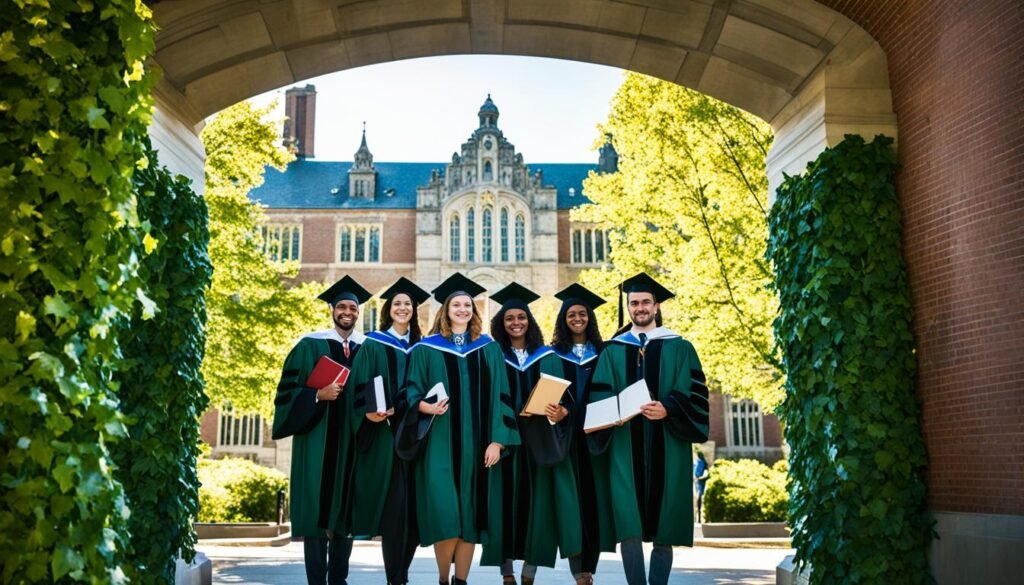
Examples from Respected Institutions
Institutions renowned for excellence have paved the way for direct-entry PhD admissions, understanding that potential is not limited by degrees but by dedication and skill. These doctoral programs are not elusive; they are presented by top-tier universities and are structured to nurture prodigious talent with a bachelor’s as their highest academic accolade.
Requirements for Transitioning from a Bachelor’s to PhD
Navigating from an undergraduate degree to a doctorate is an ambitious transition, but what does it entail? Doctoral admissions requirements vary across disciplines and institutions, yet they share a common thread of seeking candidates with a robust academic foundation and demonstrated research prowess. To set yourself apart, you’ll need to showcase:
- Completion of advanced coursework pertinent to your intended PhD field.
- Substantial research experience, possibly proven through published work or involvement in significant projects.
- Quantitative skills for fields like Economics or deep theoretical understanding for specialties such as Psychology.
Your aspiration for a doctoral level education can very well skip the master’s intermission with direct-entry PhD pathways. Ambition paired with intellectual capability may be your ticket to a PhD admission sans Master’s, even at the most prestigious universities.
The Case for Gaining Research Experience Pre-PhD
Are you eyeing a coveted spot in a PhD program without the standard rung of a master’s degree? If your ambition is to delve into doctoral research, understanding the vast landscape of research qualifications is imperative. Key to this is harnessing opportunities that underline your research capabilities, often a critical component of alternative entry to PhD pathways.
Alternative Pathways to Demonstrating Research Capabilities
Not all scholars follow the traditional academic trek. Many PhD programs now recognize the value of diverse experiential learning and provide alternative entry points to their doctoral studies. If you’ve cultivated a wealth of knowledge through non-conventional means, there are novel ways to showcase your research qualifications:
- Participate in industry-related research projects that align closely with your PhD interests.
- Author or co-author research papers in respected journals or publications in your field.
- Engage in academic conferences, workshops, or symposiums as a presenter or attendee.
- Connect with leading researchers for collaborative projects or mentorship opportunities.
- Compile a comprehensive portfolio of your research activities, emphasizing your depth of knowledge and initiative.
Impact of Professional Experience on PhD Admissions
When your career has been your classroom, the lessons learned through professional research experience can be just as meaningful as any coursework. For many PhD programs, a candidate with significant industry experience can bring a valuable practical perspective to academic research. Consider how your professional life could strengthen your PhD application:
- Identify the transferable skills from your professional work that would benefit your PhD research.
- Document any substantial projects or research endeavors and their outcomes that are pertinent to your field of study.
- Quantify your experiences, demonstrating your contributions to the field and continued professional development.
- Garner recommendations from colleagues, supervisors, or industry peers who can attest to your research acumen and potential for scholarly success.
By consolidating both your academic pursuits and your experiential learnings, you can create a powerful case for your readiness to undertake a PhD. Whether through conventional routes or an alternative entry to PhD , your unfaltering dedication and tangible research qualifications may very well set the stage for your future in academia or professional research.
Sector-Specific Considerations for Doctoral Studies without a Master’s
When you’re considering pursuing a doctoral degree, understanding the landscape of your specific academic field is crucial. For those keen on bypassing a master’s degree, you will find that certain sectors have unique prerequisites and expectations for prospective PhD candidates.
STEM Fields Favoring Practical Experience
If you’re aiming for a STEM PhD , your ability to showcase relevant, hands-on experience carries significant weight. STEM disciplines often prioritize practical application, which can play to your advantage in the admissions process. With fields that are constantly evolving due to technology and innovation, research experience can sometimes eclipse the need for the theoretical depth of a master’s degree. Here are a few points to bear in mind:
- Having direct exposure to scientific research could be more influential than a master’s transcript.
- Institutions frequently seek individuals who have contributed to publications or important projects in their undergrad years.
- Demonstration of problem-solving skills in a lab setting can substantiate your readiness for doctoral work.
Arts and Humanities: The Rarity of Direct Admission
The path to a PhD in the Arts and Humanities stands in contrast to the route taken by STEM aspirants. Direct arts doctorate admissions without a master’s degree are less common because these fields often value a rich tapestry of theoretical knowledge that typically comes with graduate study. As you consider applying, keep the following in mind:
- A master’s degree often equips candidates with critical analysis and in-depth study of historical texts and contexts, which is highly regarded.
- Direct admissions may be offered to exceptionally talented individuals who can display their scholarly potential through extensive writing samples or creative work.
- For those in the Arts and Humanities, the master’s degree provides a platform for exploration and specialization that can be critical in defining a doctoral research trajectory.
In both sectors, the journey to a PhD without a master’s degree can present its unique challenges and rewards. It’s about aligning your educational background and professional or research experience with the requirements and values of your field of choice.

Diverse Routes to Achieving a Doctorate at The Continents States University
Unlock the potential of a tailored doctorate program with The Continents States University , an innovative institution in the heartland of Missouri that paves the way for a variety of higher education paths . Stepping outside the conventional boundaries, the university offers doctorate programs designed to honor your life’s work and academic excellence, without mandating a master’s degree as a prerequisite.
Embarking on a doctorate journey at The Continents States University means navigating a path that appreciates your unique situation. Ideal for self-motivated learners, the university’s programs integrate flexibility with academic rigor, enabling you to pursue your doctoral ambitions on your own terms. Here’s what makes The Continents States University an exceptional choice:
- Programs curated to support and recognize diverse educational backgrounds .
- Flexible learning modules that cater to an array of lifestyles and responsibilities.
- A focus on practical knowledge application over traditional exam-based evaluations.
- Provisions for advanced standing through demonstrated professional or academic experience.
As you consider your next step in higher education, contemplate the doors that The Continents States University could open for you. Their dedication to accessible, inclusive education ensures that your academic pursuits align with your personal and professional growth. Remember, in the landscape of modern education, your journey is yours to design, and The Continents States University is here to light the way.
Challenges You May Encounter When Pursuing a PhD without a Master’s
Embarking on a doctoral journey is a commendable endeavor, but when you leapfrog over the master’s stage, you might hit unexpected roadblocks. Understanding the challenges is crucial to navigating the PhD path with finesse.
Issues with Credit Transfers
When you emerge from an undergraduate program straight into a PhD, one hurdle you could face is the credit transfer challenges . Not all institutions accept crossover credits, which could mean retaking courses, dedicating more time, and incurring higher higher education expenses .
The Cost Implications of Non-Transferable Credits
Your budget may feel the strain if your credits do not transfer smoothly. Additional classes equate to additional tuition fees—transforming anticipated costs into PhD program obstacles to overcome. It is imperative to scrutinize the transfer policies of your chosen institution to avoid these financial pitfalls.

As you tread the path less traveled in higher education, be sure to reach out to program advisors early on. They are a critical resource in avoiding the snags of credit transfers and can help you map a clear, cost-effective route to your PhD.
Integrating Advanced Degrees: Combined Programs and BA-to-PhD Tracks
Imagine embarking on a journey that seamlessly carries you from undergraduate studies to doctoral research, combining the depth and breadth of higher education into one cohesive experience. This is what innovative education models like combined master’s/PhD programs and BA-to-PhD tracks offer. At the forefront of these progressive pathways is The Continents States University, creating a paradigm shift in the traditional trajectory of academic advancement. Tailored for the ambitious scholar, such programs not only accelerate the learning curve but also encapsulate a comprehensive academic foundation.
The Continents States University’s Innovative Education Model
The Continents States University recognizes the evolving landscape of higher education demands and addresses this by offering students unique, integrated paths. These innovative models facilitate the conjunction of advanced degrees, providing a streamlined approach to academic excellence. As you contemplate your future in doctoral studies, consider the far-reaching impact of this inclusive and adaptive educational experience.
Understanding the Nuances of Combined Academic Pathways
Combining a master’s and PhD may seem daunting, but understanding the nuances of these academic pathways reveals their potential to shape a proficient and efficient educational journey. Whether your aspiration is to delve into research directly post-bachelor’s degree or earn a master’s alongside a PhD, these tracks have been crafted to meet your academic objectives without the repetition of curriculums, offering a robust yet expedient route to intellectual mastery.
- Simultaneous pursuit of a master’s and PhD consolidates costs and time.
- Direct BA-to-PhD tracks recognize and build on your undergraduate achievements for doctoral success.
- The blended approaches emphasize skill acquisition and contribute to your swift transition into research and professional environments.
By aligning yourself with these contemporary education models, you place yourself at the cusp of a revolutionized education system designed for the leaders of tomorrow. Embrace the possibilities that combined master’s/PhD programs and BA-to-PhD tracks provide, and pave your way to becoming a vanguard in your chosen field.
Embarking on a doctoral journey represents a formidable commitment to academic and professional growth. As we’ve navigated the possibilities, it becomes evident that the feasibility of a PhD without a master’s degree is not only a reality but also an accessible pathway for the adequately prepared individual. With the right blend of academic prowess, research prowess, and dedicated experience, you can plant your feet firmly on the road to scholarly achievement, bypassing the traditional master’s trajectory.
Summarizing the Feasibility of a PhD Without a Master’s Degree
The landscape of graduate studies is evolving, and with these shifts come new opportunities. You may ponder final considerations such as which institutions will honor your undergraduate achievements and how to present your capabilities at an advanced level. These are significant, yet navigable waters, and with thorough research into doctoral program resources, the potential to directly ascend to a PhD program is marked on your academic horizon. Embrace the exploration and ready yourself for its rigors.
Final Thoughts on the Doctoral Journey and Available Resources
As you stand poised to tread a less conventional but nonetheless prestigious path, recognize the importance of aligning yourself with supportive resources. Consult with academic advisors, explore programs that value robust research backgrounds, and take advantage of the doctoral program resources that forward-thinking universities offer. Remember, pursuing a doctorate is an exercise in perseverance and intellectual curiosity, and with careful planning, your doctoral pursuits, even without a master’s degree, can be a testament to your unique academic dedication and tenacity.
Source Links
- https://www.phds.me/ask-the-expert/can-i-earn-a-phd-without-a-masters/
- https://www.findaphd.com/guides/phd-without-masters
- https://www.discoverphds.com/advice/applying/phd-without-masters
Related Posts

Is a 3.5 Masters GPA bad?
Explore the implications of a 3.5 GPA in your Masters and why it may actually reflect strong academic performance.

Can I do Masters with 2.7 GPA?
Explore your options for pursuing a Masters with a 2.7 GPA – find programs that fit your profile and enhance your academic journey.

- Skip to primary navigation
- Skip to main content
- Skip to primary sidebar
- Skip to secondary sidebar
- Skip to footer
career-advice.jobs.ac.uk
A PhD Without A Masters Degree
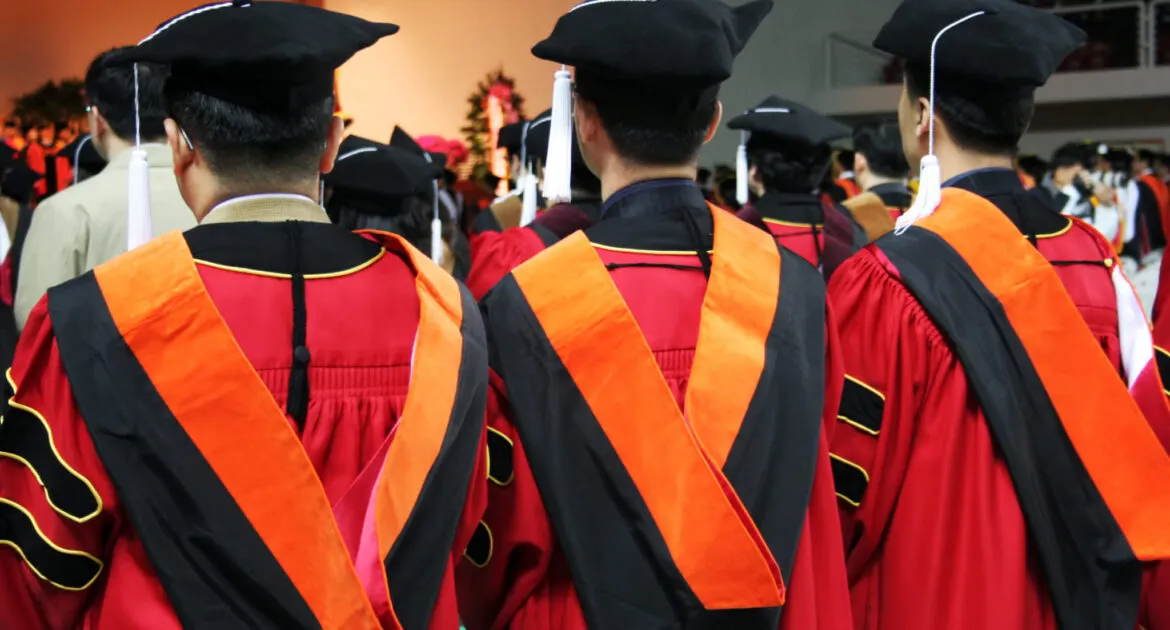
The PhD usually came after the Bachelor’s degree for many years in the United Kingdom. There was no real need to successfully gain a Master’s degree before embarking on this mammoth task of empirical research. Whilst some undergraduate degrees still lead to a Master’s qualification, and many people still complete Master degrees, it is possible to do a PhD without a Masters degree .
Firstly, your creative ideas are novel which allows for innovative, fresh approaches, in addition to exerted interest and enthusiasm for an area of study. Secondly, a Master’s degree can be quite expensive and although there are bursaries and schemes available they often still require costly personal financial contributions. Thirdly, pursuing a PhD without a Master’s degree reduces the amount of time on your studies, allowing you to follow a desired career path that motivates and excites you.
Disadvantages
The Master’s degree exists to show that the student can study at a higher level and this qualification allows you to practice the necessary research skills. This also determines if committing to a large research project is right for you. Additionally, the Master’s dissertation forms a part of the PhD in several British universities, so you are potentially gaining one to two extra years to make your original contribution to the field of study.
Applications
As with any PhD application , it is important to check your eligibility with the universities you have chosen to apply to. Different institutions have varying regulations, and in some cases, a Master’s degree might be compulsory. Also, make sure you have lots of evidence in your application about why you would make a good doctoral student by presenting concrete examples of your work at the equivalent of Master’s degree level. Additionally, be clear that you are motivated and determined to add to a body of knowledge through innovative, empirical research that requires stamina, hard work, determination and collaboration.
Coping strategies
The first few months can be overwhelming, but it is important to remember that you have been accepted as a doctoral student. This confirms that a panel of experts believe that you can achieve such a prestigious degree.
In your first term try and reread your research proposal once a week and review it critically. The nature of research is that it changes but it is also useful to remember what you proposed to do. Critical thinking is essential throughout the process.
Avail of the PhD support within the university. Regularly meet with supervisors and other doctoral researchers as support is necessary during this journey, especially in year one. Sign up to university workshops about PhD research – many run one-day skills sessions covering everything from communication to project managing. As a PhD student, you are part of a community of other doctoral researchers and this can be a great source of advice and wisdom, plus a great way of meeting new people.
In your first term, you should have regular and consistent supervision meetings. This allows your research team to set clear time goals and confirm milestones which you can work towards.
And remember, with consistent hard work, dedication, determination, collaboration and a critical mind, you will achieve your PhD .
Find your PhD here .
What is a PhD and Why Should YOU do one?
What did you think of our article? - please rate
Share this article
Dr Denise White FRSA
Dr Denise White FRSA is a multi-award-winning intellectual disability and music expert. Having over 25 years’ experience in the field of early years, primary, post-primary, special educational needs, further and higher education, Denise is known for her innovative and creative teaching methods that transforms lives. She is an advocate for inclusive and community-based ethical learning and teaching models.
She is a passionate education advocate with the talent to develop inspiring hands-on lessons that will capture a student’s imagination and breed success.
Known as ‘The Music Doctor’, Denise is an Author at Bookhub Publishing. Her Music Doctor Series will launch in March 2019. Denise is also a Speaker, Trainer, Consultant, Mentor and Researcher.
Web: www.themusicdoctor.co.uk
Twitter: @_TheMusicDoctor
Reader Interactions
You may also like:.
21st April 2020 at 11:04 am
To whom it concerns. During this enforced Covid Lockdown I explored the possibility of undertaking a Master’s in English Literature by distance learning. My Thesis has explored the topic of “Discrimination of Women in the Literature because of their gender”. As yet I am not affiliated with a University as my exploration is in earl. y stages. I have a Primary Honour’s Degree from my local University in Galway, Ireland. My query is can I bypass the Master’s and undertake a P.H.D in English Literature? I am familiar with the steps necessary to undertake the proposed course of study.
19th December 2020 at 6:03 pm
Good evening. Hope you are doing well inshaAllah. My wife wants to apply for a PHD program nearby london area. Do you have any suggestions on where to apply? She will need to apply for a student visa first in order to enrol into a graduate school. How can she apply for a student visa ? What type of governmental funding is available to her wife? My wife is a USA citizen and she already has her undergraduate degree from New York university. Plz advise me which university will be the best for my wife to enrol into a PhD program.
3rd March 2021 at 5:57 pm
I want to register fie for PHD, i only have law degree, i have no Masters degree
15th January 2022 at 3:30 pm
I want to apply for PhD. I have already have and degree and postgraduate diploma. Please advise
15th January 2022 at 3:32 pm
I have already a degree and a post graduate diploma
11th April 2022 at 10:13 am
Please advice to me where to start. I have degree in Public Administration and Political since graduated 2012 on South East European University in Skopje, in 2012 I make NARIC UK Recognized my foreign degree in UK comparable. In 2018 I have applied on South East European University Master in Business Administration and Management – Sub field Management. And I have finished all my exams on master degree but started this Pandemic Period with covid19 and I have no chance to make defend my master decertation in public defend. I am here in UK more then 10 years I am passion to study. I have EU Settled Status. I was in search for Integrated PhD ( Master and PhD ) in one. Because I have transcript but I don’t hold certificate in Master degree make me break this process. Please advice to me how to continue.
4th February 2023 at 6:47 pm
I am interested in completing a PhD, but only have a Social Science BA 2:1. Is this possible?
14th November 2023 at 2:38 pm
Firstly, you will have to improve your spelling and grammar before you apply for a PhD degree (even more so since you are a lawyer)!!!
Leave a Reply Cancel reply
Your email address will not be published. Required fields are marked *
Save my name, email, and website in this browser for the next time I comment.
Please enter an answer in digits: nineteen + 12 =
This site uses Akismet to reduce spam. Learn how your comment data is processed .
Should I Get a Master's Before a Doctoral Degree?
Do you need a master's degree to get a Ph.D.? No, but experts suggest considering these key factors before deciding.
Should I Get a Master's Before a Ph.D?

Getty Images
A master’s eases the transition to graduate work and may make you more competitive when applying to doctoral programs.
Although it's not usually a requirement, earning a master’s degree before applying to a Ph.D. or other doctoral program can be a good way to get accustomed to graduate-level coursework while gaining valuable research experience and connections in your field.
But it can also be an expensive and time-consuming detour on the route to a doctorate, so it’s important to consider whether the benefits of earning a master’s before a Ph.D. outweigh the cost.
Here are some factors experts say you should weigh.
Reasons to Get a Master’s Degree First
Karin Ash, a graduate consultant at Accepted, a college admissions consulting firm, says the research experience students can gain through a master’s tends to give them an edge in doctoral admissions.
Master's studies can also expand opportunities for students who already have significant research work behind them. Ash notes that some students she works with have research experience but choose to explore other research areas through a master's before deciding on a focus for their doctoral studies.
If your undergraduate major was fairly different from what you plan to study at a graduate level, getting a master’s degree first can help bridge the gap, says Julie Posselt, a professor of education and associate dean of the University of Southern California Graduate School. Posselt, who earned her master's before pursuing doctoral studies, says master’s studies can also help you decide whether what you’re studying is right for your academic interests and career goals .
“I learned through my master's program that the field that I had started to pursue was much more narrow than what I wanted for the long term,” Posselt says. “So instead of investing five years in a field, I was able to invest a shorter amount of time – two years – and then make the decision that if someday I wanted a Ph.D., it was going to need to be in a broader field than the one that I had during my master's.”
Ash and Posselt say a master’s can be a good way to network with experts in your field of interest and make connections that will be valuable in a future career.
“A lot of STEM students tell me they don’t have professors who know them as their classes are large,” Ash wrote in an email. “Obtaining a master’s degree will allow them to develop relationships with professors who can then write substantive recommendation letters .”
Reasons to Go Straight to a Doctoral Program
Master's degrees can be expensive , and students often don't receive significant funding to complete their studies.
“My concern is the increasing debt that American students have from their undergraduate education," Posselt says, "and the fact that most master's programs don't fund them, and as a result, students have to take out significant loans" to complete a master’s.
"I always encourage students, if they're going to get a master's degree, to try to find a place where they can get funding along the way,” she says.
On the other hand, Ash says it’s common for Ph.D. programs to be fully funded , so it may be unnecessarily costly to earn a master’s degree first – especially if it means taking out student loans .
In addition to considering the tuition cost, Posselt says it’s important to consider the earnings you could lose by delaying the start of your career by a year or two to pursue a master’s degree.
It's also worth investigating whether the doctoral program you're considering will accept some of the credits you earn in a master's program, as that could shorten your doctoral studies. But Posselt says the transferability of master's-level coursework is relatively weak and varies by institution.
Even if you do apply master's coursework to your Ph.D., it may not be worthwhile.
"Many Ph.D. programs will accept credits from courses taken at the master's level if the coursework is relevant to the program," Ash says. "However, often the applicant is veering to a more specialized education and will need to take the appropriate coursework to become proficient in that subject area. This could mean they end up with many more credits than needed to graduate."
If you’re still unsure whether you should pursue a master’s first, Posselt says it’s important to consider the leverage the degree could have when it comes to doctoral admissions. A master’s is more valuable in some fields than others, she notes, so consulting with advisers and mentors from your undergraduate studies is a good way to determine how useful it will be when pursuing doctoral work.
Grad Degree Jobs With $100K+ Salaries

Tags: graduate schools , education , students
You May Also Like
Different jobs with med degree.
Jarek Rutz April 30, 2024

Completing Medical School in Five Years
Kate Rix April 30, 2024

Dealing With Medical School Rejection
Kathleen Franco, M.D., M.S. April 30, 2024

Should You Take the LSAT More Than Once?
Gabriel Kuris April 29, 2024

How to Win a Fulbright Scholarship
Cole Claybourn and Ilana Kowarski April 26, 2024

What to Ask Law Students and Alumni
Gabriel Kuris April 22, 2024

Find a Strong Human Rights Law Program
Anayat Durrani April 18, 2024

Environmental Health in Medical School
Zach Grimmett April 16, 2024

How to Choose a Law Career Path
Gabriel Kuris April 15, 2024

Questions Women MBA Hopefuls Should Ask
Haley Bartel April 12, 2024

15 Best Online Doctoral Programs/PhD Programs – 2024
April 24, 2024

If you’re looking to attain a terminal degree but want to skip the commute to campus, an online doctoral program might be a great option for you. As our world becomes increasingly digital, many top universities have branched out into online learning, offering online PhD and doctoral programs that are just as rigorous as their in-person counterparts. Online graduate education can offer aspiring doctoral students flexibility, a high-quality education, and the option to continue working while pursuing a degree.
Many of the universities below in our round-up of the best online doctoral programs offer degrees in education—a common track for teachers looking to advance their careers. But universities across the country offer a wide range of degrees in everything from engineering management to library science. Read on for everything you need to know as you consider applying.
The Best Online Doctoral Programs – How Long Does It Take to Get a Doctoral Degree Online?
Online doctoral programs are often designed with full-time professionals in mind, prioritizing flexibility so that you can complete your degree at your own pace. Program lengths will vary, but most will take four to seven years. For students who need to take things slower, many programs offer options to spread degree requirements out over time. When applying, here are a few good questions to ask your admissions officer:
- How long do most graduate students take to complete their degrees?
- Are there flexible options for how many courses you’ll take per term?
- Will you pay tuition per semester or per credit hour? If paying by credit hour, will you able to choose how many classes you take each semester?
- Will you be required to write a dissertation? If so, how long do students usually take to write them?
The Best Online Doctoral Programs – Is an Online PhD Program a Good Fit for Me?
There’s no denying it: online doctoral programs are different than traditional ones. Many traditional PhD programs are designed for future academics, aka for graduate students who intend to apply for jobs as university professors after graduation. Traditional PhD programs are full-time, research-focused, in-person, and often offer graduate students funding in exchange for teaching or research assistant responsibilities. Online doctoral programs do also involve research, but most online graduate students are not full-time students. Rather, many students enrolled in online doctoral programs are working professionals who attend classes in the evenings or asynchronously. With that in mind, an online program can be a fantastic opportunity to further your current career.
An online doctorate program could be a great fit for you if:
- You want to advance your career. A doctorate can lead to further opportunities for promotion and certain fields offer automatic pay increases for people with advanced degrees.
- You love research and want to develop expertise in a topic that fascinates you.
- You learn well in online settings, including asynchronous classes.
- You plan to continue working while you study.
Online doctoral programs typically do not offer their students funding, though there may be scholarships and grants available to you.
The Best Online Doctoral Programs – What to Consider When Choosing an Online Doctorate Program
Since a doctorate can take 4-7 years or more to complete, choosing the right school for you is a huge decision. Our list below dives into many details you’ll need to know like acceptance rate, retention rate, and cost of tuition. It’s important to consider big-picture factors such as:
- Time to complete degree
- Professors and mentors—you’ll want to make sure you can study with faculty who have expertise in your academic interests
- Flexibility—does the program fit with your schedule? Do they require any in-person meetings?
- Graduation rate—ask your admissions officer for the most recent figures
You’ll also want to consider whether you want to pursue a PhD or a doctorate degree. If you’re pursuing a PhD, you can expect to focus more significantly on academic research and you’ll need to complete a dissertation. A doctorate is an equivalent degree that is less focused on academic research and may not require a dissertation. Doctorates can often involve more career development or hands-on practicum experience.
The Best Online Doctoral Programs – Are Online PhDs Respected?
Yes, online doctoral programs are just as rigorous and respected as their in-person counterparts. If you hope to earn a tenure-track faculty position at a university, it’s likely a traditional PhD program will be a better route. However, if you’re seeking a doctorate for career advancement and further learning, an online doctoral program can be a great fit. Many of the most prestigious universities offer online programs, and your diploma will likely not specify whether you completed an online or traditional degree.
The Best Online Doctoral Programs – What Do I Need to Apply?
Application requirements will vary depending on the program you’re applying to. All programs will require your academic transcripts, many require letters of recommendation, and some require GRE scores. On top of that, some programs will require a personal statement or writing portfolio. Contrary to what you might think, Master’s degrees are not always required for admission to online doctoral programs.
The Best Online Doctoral Programs/PhD Programs
1) university of florida.
Located in Gainesville, the University of Florida offers 10 different online doctoral programs . Well known for its graduate programs in education, educators can pursue PhDs in educational leadership, special education, computer science education, among other options. UF also offers online programs in nursing, Latin and Roman studies, microbiology, and a few other fields. Established in 1853, UF is a flagship state university with a strong reputation.
- Graduation Rate: 89%
- Acceptance Rate: 31%
- In State Tuition: $6,380
- Out of State Tuition: $28,658
- Application Requirements: Application portfolio (sample essays or projects), GRE scores, minimum undergraduate GPA of 3.4 or graduate GPA of 3.5, letters of recommendation
2) George Washington University
George Washington University ’s Department of Engineering Management and Systems Engineering leads the way with the university’s most comprehensive online PhD offerings . Through them, students can pursue doctoral degrees in cybersecurity analytics, engineering in artificial intelligence, systems engineering, or engineering management. Educators can also pursue well-respected degrees in education leadership and human and organizational learning.
- Graduation Rate: 85%
- Acceptance Rate: 43%
- Tuition: $31,770
- Application Requirements: GRE scores, personal statement, letters of recommendation, academic records
3) Johns Hopkins University
- A ten-year-old program , Johns Hopkins ’ online PhD in education allows students to specialize in digital age learning, entrepreneurial leadership, urban leadership, and other topics. Note their high graduation rate: Johns Hopkins is a competitive program , but admitted students are well-supported on their path to graduation.
- Graduation Rate: 94%
- Acceptance Rate: 11%
- Tuition: $57,010
- Application Requirements: Master’s degree, minimum GPA of 3.0
Best Online Doctoral Programs/PhD Programs (Continued)
4) texas tech university.
Texas Tech University offers a wide range of online and hybrid PhD programs that provide their students flexibility as they work toward completing their terminal degree. An affordable university in Lubbock, Texas Tech is a great place for future doctors of education, consumer science, technical communication, engineering management, and financial planning.
- Graduation Rate: 63%
- Acceptance Rate: 70%
- In State Tuition: $6,788
- Out of State Tuition: $14,968
- Application Requirements: Academic transcripts, portfolio and personal statement varies by program
5) Iowa State University
Although Iowa State University ’s online doctorate programs require some in-person meetings, ISU may still be a good fit for online students. With more uncommon online doctoral programs in hospitality management and apparel, merchandising, and design, ISU offers flexible routes to completing your dissertation.
- Graduation Rate: 75%
- Acceptance Rate: 88%
- In State Tuition: $9,758
- Out of State Tuition: $24,720
- Application Requirements: Academic records, minimum 3.0 GPA
6) University of Alabama
Online University of Alabama students may miss out on a lively campus culture and football games, but they can still take advantage of UA’s top-notch academics. Well-known for its online education graduate programs, UA also offers programs in social work, communication and information sciences, and engineering.
- Graduation Rate: 72%
- Acceptance Rate: 80%
- In State Tuition: $11,940
- Out of State Tuition: $32,300
- Application Requirements: GRE scores, academic records
7) University of Missouri
One of the most robust in terms of online offerings, the University of Missouri ’s online PhD classes are taught by the same professors who teach Mizzou’s in-person classes. Mizzou offers programs in education and nursing. They also allow students to pursue doctorates in harder-to-find subjects like health sciences, agriculture, architecture, and library science.
- Graduation Rate: 73%
- Acceptance Rate: 82%
- In State Tuition: $9,478
- Out of State Tuition: $25,946
- Application Requirements: Academic record, minimum GPA of 3.0, portfolio and personal statement varies by program
8) University of North Carolina Chapel Hill
One of the oldest public universities in the U.S., University of North Carolina – Chapel Hill is known as a leader in education. UNC Chapel Hill offers just three online PhDs: public health, nursing, and education. Although some online classes require in-person or proctored final exams, doctoral requirements can mostly be completed online.
- Graduation Rate: 91%
- Acceptance Rate: 25%
- In State Tuition: $9,208
- Out of State Tuition: $36,891
- Application Requirements: GRE scores, academic records, letters of recommendation, personal statement
9) Georgia Southern University
Located in Savannah, Georgia Southern University works hard to create an environment of support and collaboration, even online. One of the more robust programs out there, GSU offers respected online programs in public health, nursing, education, and engineering.
- Graduation Rate: 54%
- Acceptance Rate: 91%
- In State Tuition: $4,986
- Out of State Tuition: $19,890
- Application Requirements: Minimum GPA of 3.0
10) Indiana University
Indiana University allows students to study at their own pace through flexible online doctoral programs. One of the only schools to offer online programs in music therapy and philanthropy leadership, IU also allows students to pursue tracks in health sciences, education, and computing and technology. Most classes are asynchronous and students can take courses through any IU campus.
- Graduation Rate: 41%
- Acceptance Rate: 92%
- In State Tuition: $9732
- Out of State Tuition: $21,160
- Application Requirements: GRE scores, academic record
11) Mississippi State University
A solid option for future doctors of philosophy, Mississippi State University is a research-focused and inclusive university. An especially strong option for those looking to study engineering or computer science, MSU offers 9 different majors within those fields. MSU also offers tracks in plant science and education leadership.
- Graduation Rate: 64%
- In State Tuition: $9,398
- Out of State Tuition: $25,444
- Application Requirements: Academic record, letters of recommendation, personal statement
12) Appalachian State University
Although Appalachian State University is known for its beautiful setting in Boone, North Carolina, App State still has much to offer online students. This school offers only one part-time PhD program in education leadership , but its affordability compared to other programs makes this school stand out.
- In State Tuition: $4,839
- Out of State Tuition: $18,271
- Application Requirements: Academic record, GRE scores or 3.0 minimum GPA, Master’s degree
13) Purdue University
An online doctoral program that maintains a high standard of excellence, Purdue is a great place for future doctors of technology, educational leadership and policy, and higher education. Purdue graduate students can expect to co-author papers with faculty and gain hands-on experience in research.
- Graduation Rate: 38%
- Acceptance Rate: 30%
- Tuition: $420 per credit
14) Concordia University Chicago
Concordia University ’s online doctoral programs allow students to complete their degree in three to five years. Through their shortened term system, students take 8-week classes and then write their dissertation in their final three semesters. A leader in online doctoral programs, Concordia offers paths in strategic innovation, healthcare management, education leadership, and organizational leadership.
- Tuition: $9,090
- Application Requirements: Academic record, Master’s degree with minimum 3.0 GPA, letters of recommendation, portfolio and personal statement varies by program
15) Clemson University
A public school in South Carolina, Clemson aims to prepare online doctoral students for diverse career paths. Proudly offering programs that are difficult to find elsewhere, Clemson graduate students can study healthcare genetics and parks, recreation, and tourism management. Education professionals can complete degrees in education systems, learning science, and teaching, literacy, language, and culture.
- Graduation Rate: 84%
- Acceptance Rate: 49%
- In State Tuition: $10,600
- Out of State Tuition: $22,050
- Application Requirements: Academic record, letters of recommendation, portfolio and personal statement vary by program
The Best Online Doctoral Programs – Additional Resources
Looking to learn more about graduate school admissions? We’ve got you covered.
Admissions Tips
- What is a Good GRE Score?
- Write a Grad School Statement of Purpose in 12 Simple Steps
- How to Get into Grad School with a Low GPA
- Do You Need a Master’s to get a PhD?
More about Online Learning
- Best Online MSW Programs
- Best Master’s in Public Health Online Programs
- Hybrid and Online DBA Programs
- Graduate School Admissions

Christina Wood
Christina Wood holds a BA in Literature & Writing from UC San Diego, an MFA in Creative Writing from Washington University in St. Louis, and is currently a Doctoral Candidate in English at the University of Georgia, where she teaches creative writing and first-year composition courses. Christina has published fiction and nonfiction in numerous publications, including The Paris Review , McSweeney’s , Granta , Virginia Quarterly Review , The Sewanee Review , Mississippi Review , and Puerto del Sol , among others. Her story “The Astronaut” won the 2018 Shirley Jackson Award for short fiction and received a “Distinguished Stories” mention in the 2019 Best American Short Stories anthology.
- 2-Year Colleges
- Application Strategies
- Best Colleges by Major
- Best Colleges by State
- Big Picture
- Career & Personality Assessment
- College Essay
- College Search/Knowledge
- College Success
- Costs & Financial Aid
- Dental School Admissions
- Extracurricular Activities
- High School Success
- High Schools
- Law School Admissions
- Medical School Admissions
- Navigating the Admissions Process
- Online Learning
- Private High School Spotlight
- Summer Program Spotlight
- Summer Programs
- Test Prep Provider Spotlight

“Innovative and invaluable…use this book as your college lifeline.”
— Lynn O'Shaughnessy
Nationally Recognized College Expert
College Planning in Your Inbox
Join our information-packed monthly newsletter.
I am a... Student Student Parent Counselor Educator Other First Name Last Name Email Address Zip Code Area of Interest Business Computer Science Engineering Fine/Performing Arts Humanities Mathematics STEM Pre-Med Psychology Social Studies/Sciences Submit

4 Valuable Master’s Degrees You Can Get Online
Online degrees are a powerful and popular way for students to advance their knowledge and careers. In fact, in 2021, 26% of advanced degree seekers studied exclusively online. Graduate students, in particular, enjoy the flexibility, affordability, and wide range of online degree programs available.
Furthermore, online learning lets candidates work and manage their home lives while earning their master’s degrees and furthering their careers. Plus, employers now recognize and respect the value of online education just as much as traditional, in-person programs.
Read on to learn about a variety of valuable online master’s degrees, with a special emphasis on the ones offered at Goodwin University.
What is an online master’s degree?
Much like traditional master’s degrees, online master’s degrees allow students to build advanced knowledge in their field of interest. Through a master’s program online, students develop a specialized body of theoretical and applied knowledge, forge a deeper understanding of their area of study, and develop a range of skills that can help advance their careers.
Unlike traditional master’s degrees, however, an online master’s degree is a graduate degree that students can complete from the comfort of their own homes or anywhere with an internet connection. It adds incredible flexibility to the graduate student’s life, enabling them to balance their education with other priorities like a career or family at home.
With a master’s degree, graduates have more opportunities to qualify for advanced positions or promotions in their field or pursue further postgraduate education, such as a doctoral degree.
Online master’s degree programs teach course material through a series of online lectures, with forums for online discussions and assignments.
Students should also look for online graduate programs that offer:
- Collaboration tools: Discussion forums (Blackboard) and video conferencing software allow you to connect with classmates and professors.
- Course reference materials: Access a variety of resources, such as audio and video files, PDFs, presentations, syllabi, and readings.
- Exams and quizzes: Take exams, quizzes, and assignments online.
- Grades and progress reports: Track your progress and see your grades easily.
- Live or recorded lectures: Depending on the program, you may have access to live or pre-recorded lectures.
- Technical support services: Many online programs offer technical support to help you navigate the online learning environment.
What are the benefits of a master’s degree online?
There are many benefits to pursuing your master’s degree online .
At a high level, some industries require candidates to get their master’s education — and online learning makes this requirement more accessible. For others, an online master’s degree helps them reach the top positions in their field.
Online master’s degrees benefits include:
- Flexibility: Students can earn their master’s degree online and still work full-time . Online master’s degrees allow you to read, view lectures, take tests, and communicate with your instructor virtually, saving you extended time commuting or sitting in class. Students choose when to sign up, sign in, and study based on their needs and schedule.
- Higher salaries: Master’s degree holders earn a median weekly average of $1,574 , whereas bachelor’s degree holders earn a median weekly average of $1,334. Additionally, online programs are often more affordable than traditional, on-campus graduate programs, making the ROI of a master’s degree even greater when earned digitally.
- Proper professional growth: Online master’s degrees are a great way to specialize in your chosen area of study and often lead to higher positions and titles. Additionally, in fields like education or nursing , candidates are required to have their master’s degrees to obtain advanced roles.
- Stand out: Employers want qualified, skilled, and educated employees, and a master’s degree proves you are an elite, hirable individual.
Four valuable online master’s degrees
There are many valuable online master’s degrees available to students at colleges and universities of all shapes and sizes.
Students will need to do their research to find a program that meets their needs, interests, and goals, however, as each institution offers different master’s degrees online.
1. Master of Education (M.Ed.) in Teacher Leadership
A Master of Education (M.Ed.) in Teacher Leadership degree is designed for creative and analytical advocates and educators.
Students develop the skills, techniques, and experience to provide access to learning by reducing and removing physical, cognitive, intellectual, and organizational barriers for their students.
At Goodwin University, this flexible, 30-credit program is offered entirely online and is therefore optimal for those who teach full-time or care for their families. Additionally, up to six credits can be granted to students entering the program from prior learning as part of the Alternative Route to Certification.
Goodwin graduates find fulfilling careers as educational administrators, school principals, university professors, curriculum specialists, corporate trainers, and more.
2. Master of Science in Nursing (MSN)
Nurses looking to advance their knowledge and continue moving up the ranks in the healthcare system can do so in as few as 20 months, part-time, with an online Master of Science in Nursing (MSN) degree .
The online MSN program at Goodwin combines nursing and population health, broadening professional nurses’ knowledge, perspective, and capacity to serve larger populations and demographics in need.
It also prepares aspiring nurse leaders for management and supervisory roles, such as Nurse Administrator.
Goodwin University’s Master’s in Nursing online program covers topics such as Pathophysiology, Pharmacology, Leadership Practices, Research, Policy, Politics, and the organization of healthcare.
3. Master of Science in Organizational Leadership (MSOL)
A Master of Science in Organizational Leadership (MSOL) is best suited for individuals looking to achieve management and leadership roles – whether for a non-profit, government, manufacturing, education, or corporate company or organization.
Popular courses include:
- Data-Driven Decision Making for Executives
- Leading Organizational Change
- Negotiation and Conflict Response
- Performance management
- Sustainability of Innovation and Strategic Advantage
This fully online degree program can also be completed in as few as 20 months, part-time, making it easy to maintain a career while completing your graduate education.
4. Master’s in Public Health (MPH)
Online Master’s in Public Health (MPH) programs offer candidates the ability to grow their voice and impact in health care and carry out work that will improve the greater good.
Students in these programs can focus on a specific area that meets their personal and professional development goals. At Goodwin University, our Master’s in Public Health (MPH) students can specialize in community health, global health, or health policy and management.
Graduates of this fully online master’s degree go on to rewarding careers as:
- Biostatisticians
- Community health nurses
- Congressional staffers
- Environmental health officers
- Epidemiologists
- Public health officers
- Health promotion specialists
- Non-profit executive directors
- Public health traveling nurses
- Researchers
Earn your online master’s degree at Goodwin University
At Goodwin University, our career-focused and online master’s degree programs are designed to put your professional growth first.
Plus, they are meant to get you exercising your skills and get you working fast. In addition to gaining career-specific knowledge sets, and connecting with like-minded peers and faculty, pursuing these online master’s degrees gives you the chance to hone your time management skills, technical aptitude, and remote work skills that can carry through to your future career.
Contact us today for more information about our online master’s degree programs and see how we can help you carve a path toward a career you love (at a flexible and achievable pace).

Goodwin University is a nonprofit institution of higher education and is accredited by the New England Commission of Higher Education (NECHE), formerly known as the New England Association of Schools and Colleges (NEASC). Goodwin University was founded in 1999, with the goal of serving a diverse student population with career-focused degree programs that lead to strong employment outcomes.

Direct PhD Entry For Four-Year Degree Holders: All You Need To Know
I n a move that could benefit a large section of students pursuing research, the University Grants Commission (UGC) has allowed students with 4-year undergraduate degrees to directly appear for the National Eligibility Test (NET) and pursue PhD.
New qualification for PhD
For pursuing PhD with or without a Junior Research Fellowship (JRF), students with 4-year undergraduate degrees need a minimum of 75 per cent aggregate marks or an equivalent grade.
Currently, a NET candidate requires a master's degree with a minimum of 55 per cent marks.
The NET is conducted twice a year, in June and December. Its scores are currently used to award a Junior Research Fellowship (JRF) and to determine eligibility for an appointment as an assistant professor for those with a Master's degree.
Relaxation for reservation category
Further, a relaxation of five per cent marks or its equivalent grade may be allowed for those belonging to SC, ST, OBC (non-creamy layer), differently-abled, economically weaker sections and other categories of candidates as per the decision of the UGC from time to time.
Will strengthen research
According to UGC Chairman Jagadesh Kumar permitting undergraduate students into PhD programs through NET will strengthen the research ecosystem in India and "open up" many opportunities for students at a "very young age" in research.
"One of the objectives of NEP is to strengthen the research ecosystem in our universities. When we permit undergraduate students into PhD programs, you will have a lot of young people getting into research at a very young age, and they are really creative," Kumar said.
Aptitude for PhD
According to him, it is necessary to see if the student has the aptitude for doing a PhD .
"Currently, the assistant professor can take 4 PhD students, the associate professor can take six PhD students and the professor can take 10 PhD students, so we already have a lot of opportunities for admitting a large number of PhD students," he said.
"We also need to see whether the student has the aptitude for doing a PhD. PhD is not like an undergrad or a master's degree program. That's the reason why we are saying that the student has to clear the UGC NET, but they also have to attend an interview at the university where their research aptitude and readiness for doing research will be examined," he added.
For more news and current affairs from around the world, please visit Indiatimes News.


IMAGES
VIDEO
COMMENTS
Yes, it's possible to get a PhD without first having a Masters degree. The conventional route for someone who earns a PhD is to pursue a Bachelor's degree, followed by a Masters degree and then a PhD. However, several students opt to bypass a Master's degree by enrolling onto a doctoral programme as soon as they complete their ...
Without a Masters degree you will have limited (if any) experience of maintaining a supervisor relationship, conducting original research and writing up your findings - all important parts of doing a PhD. But it is important to remember that while it might initially feel overwhelming, that's not to say you won't catch up.
Similarly, you can get a PhD in the Ohio State University's chemical engineering programme without having done a master's. Across the pond, the University of Cambridge can accept students without a master's degree, where they'll be placed in a probationary year before progressing into their dissertation. As you can see, various routes ...
Saybrook University offers a PhD in Clinical Psychology program that is fully online. Students who do not hold a master's degree must complete 103 to 109 credits to graduate, while those who do have a master's in a related field must complete 100 to 106 credits. The program can typically be completed in 5 years.
In most cases, if you want to study a PhD and you don't have a bachelor's degree, but you do have a lot of industry and research experience in your field, you'll need to start your journey by enrolling in a graduate certificate and working your way up to a master's and then a PhD. It's possible to get into a PhD program with a graduate diploma (and no bachelor's or master's ...
It's almost a sure pass to a doctoral programme. 3. A Master's is the only way to a PhD in a new field. It does not matter where you want to pursue a PhD, if you don't have the right academic background in a connected subject area, your chances of being accepted to a PhD are little to zero. So, if you want to change careers and pursue a ...
Yes. Fields where you can get a Ph.D. without a master's include clinical psychology and government. These and other programs combine the master's and Ph.D. curricula. Not all universities or academic departments let you earn a Ph.D. without a master's degree. However, they may let you apply if you hold a master's in a different field.
Jan 25, 2024. Yes, it is possible to earn a PhD without a master's degree. Though the traditional path entails completing a master's program before embarking on a doctorate, some schools and programs offer options to skip the master's entirely. Actually, in select cases, it's the preferred approach. Below, we'll share four common ...
Direct Entry to PhD: Many U.S. universities now offer programs allowing students to pursue a PhD directly after completing their bachelor's degree, bypassing the master's. Time and Cost Efficiency: This pathway saves time and money, reducing the overall duration and cost of higher education. Research Focus: Direct PhD programs emphasize ...
No, a master's degree is not always required to earn a PhD. A number of schools may allow you to enroll in a PhD-level program without having previously obtained your master's degree if you meet the school's and program's admission criteria. In some cases, Ph.D. programs may allow you to skip the need to obtain a master's degree.
Yes, it is possible to get a Ph.D. without having a Master's degree first. Conventionally, if you wanted to pursue a Ph.D., you would first get your Bachelor's degree, then your Master's degree, and then apply for a PhD. However, there are a few unconventional ways of getting a Ph.D. Firstly, you can opt to bypass your Master's degree ...
PhD Without Masters: The Cons. While it is possible to apply to a doctoral program without having completed a master's degree, there are a number of potential disadvantages associated with this approach. One is that holders of a master's degree often have more background knowledge in the field they wish to pursue at the PhD level, which can ...
A direct PhD program, sometimes referred to as an integrated or combined PhD program, is a doctoral-level academic program that allows students to pursue a PhD degree without first obtaining a master's degree. In traditional PhD programs, students typically complete a master's degree before embarking on their doctoral studies.
Direct Entry PhD programs allow students with a Bachelor's degree to apply directly for a PhD in their field, without first completing a master's degree. They are typically 4-5 years long, so they are appealing for students who want to earn a graduate degree and shave a few years off their timeline to graduation.
The Benefits of Doing a Master's Degree Before a PhD. A master's degree allows someone to gain additional skills, research experience and domain-specific knowledge. When a supervisor is looking for potential PhD students, amongst other things they want to see that a candidate has: Interest in the subject; Research experience; Subject knowledge
University of Illinois at Urbana-Champaign. University of Michigan - Ann Arbor. Yale University. While pursuing a PhD without a master's degree may seem like a daunting task, it can be a great option for those who are passionate about their field of study and want to dive deeper into research.
Doing a PhD without a Masters is feasible in any field of study, but it is more prevalent in STEM or vocational fields. The majority of Arts and Humanities doctoral programs typically need the completion of a Master's degree. Doing a PhD without a Masters provides an accelerated path toward a PhD and eliminates the need for a Master's degree.
Deciding to pursue a PhD without first earning a Master's degree is an intensely personal choice, often contingent on an individual's academic journey and goals. Securing a Master's degree before entering a PhD program usually enriches your understanding of the field, refines your research skills, and may increase your chances of securing ...
A master's is a 1- or 2-year graduate degree that can prepare you for a variety of careers. All master's involve graduate-level coursework. Some are research-intensive and intend to prepare students for further study in a PhD; these usually require their students to write a master's thesis. Others focus on professional training for a ...
Summarizing the Feasibility of a PhD Without a Master's Degree. The landscape of graduate studies is evolving, and with these shifts come new opportunities. You may ponder final considerations such as which institutions will honor your undergraduate achievements and how to present your capabilities at an advanced level. These are significant ...
The PhD usually came after the Bachelor's degree for many years in the United Kingdom. There was no real need to successfully gain a Master's degree before embarking on this mammoth task of empirical research. Whilst some undergraduate degrees still lead to a Master's qualification, and many people still complete Master degrees, it is possible to do a PhD without a Masters degree.
A PhD program typically takes 5-6 years to complete. PhD students are given ample opportunity in their first year to not only take classes in their field, but also to engage in research. They qualify for a Masters degree after completing certain requirements in 1-2 years. They can leave at this point with a Masters, without having paid any ...
Although it's not usually a requirement, earning a master's degree before applying to a Ph.D. or other doctoral program can be a good way to get accustomed to graduate-level coursework while ...
@msh210: Some (I don't know about most) US math PhD programs do offer such a thing, but the vast majority of the students (nationwide) don't get a master's degree if their eventual goal is a PhD. In some departments, Master's degrees are only given to students who decide to leave the PhD program after completing enough coursework. -
Applicants need a master's degree with at least 36 graduate credits to qualify for the program. What To Know ... Online degrees allow learners to pursue higher education without putting their ...
Application Requirements: Master's degree, minimum GPA of 3.0; Best Online Doctoral Programs/PhD Programs (Continued) 4) Texas Tech University. Texas Tech University offers a wide range of online and hybrid PhD programs that provide their students flexibility as they work toward completing their terminal degree. An affordable university in ...
Graduate school is an experience shared by a rather small group of people—14.4 percent according to the U.S. Census Bureau. Without doubt, pursuing a graduate degree involves a lot of work, and that may lead to graduate students feeling like they are, at times, barely surviving the demands placed upon them.
Photo: Getty Images. The Humphrey School of Public Affairs is collaborating to offer a new and innovative certificate in Sustainable Environmental, Social and Governance (SESG) Leadership — the University of Minnesota's first graduate-level program in this specialty — beginning this fall. The program will address a growing need for professionals with the skills to navigate today's ...
Higher salaries: Master's degree holders earn a median weekly average of $1,574, whereas bachelor's degree holders earn a median weekly average of $1,334. Additionally, online programs are often more affordable than traditional, on-campus graduate programs, making the ROI of a master's degree even greater when earned digitally.
New qualification for PhD. For pursuing PhD with or without a Junior Research Fellowship (JRF), students with 4-year undergraduate degrees need a minimum of 75 per cent aggregate marks or an ...